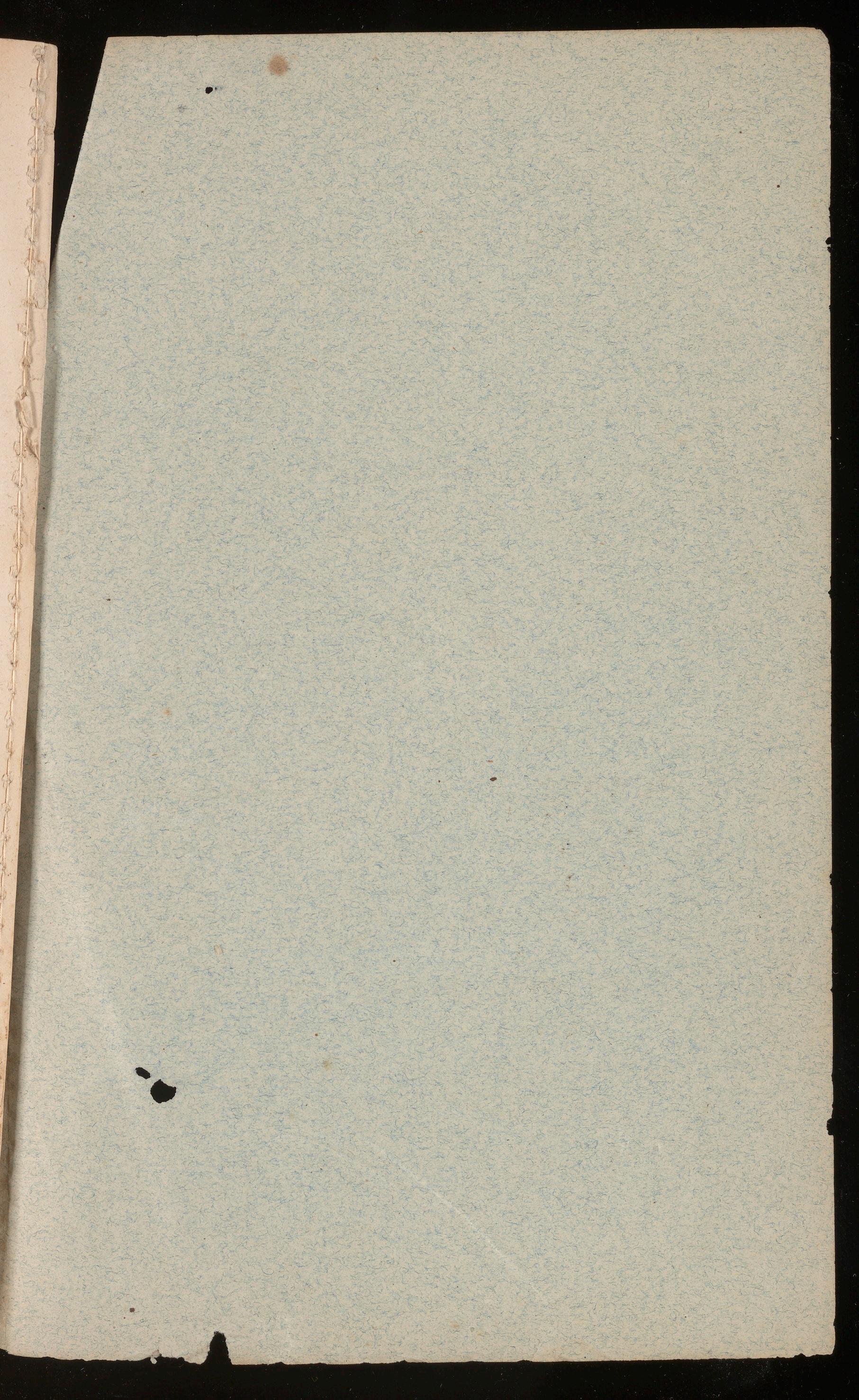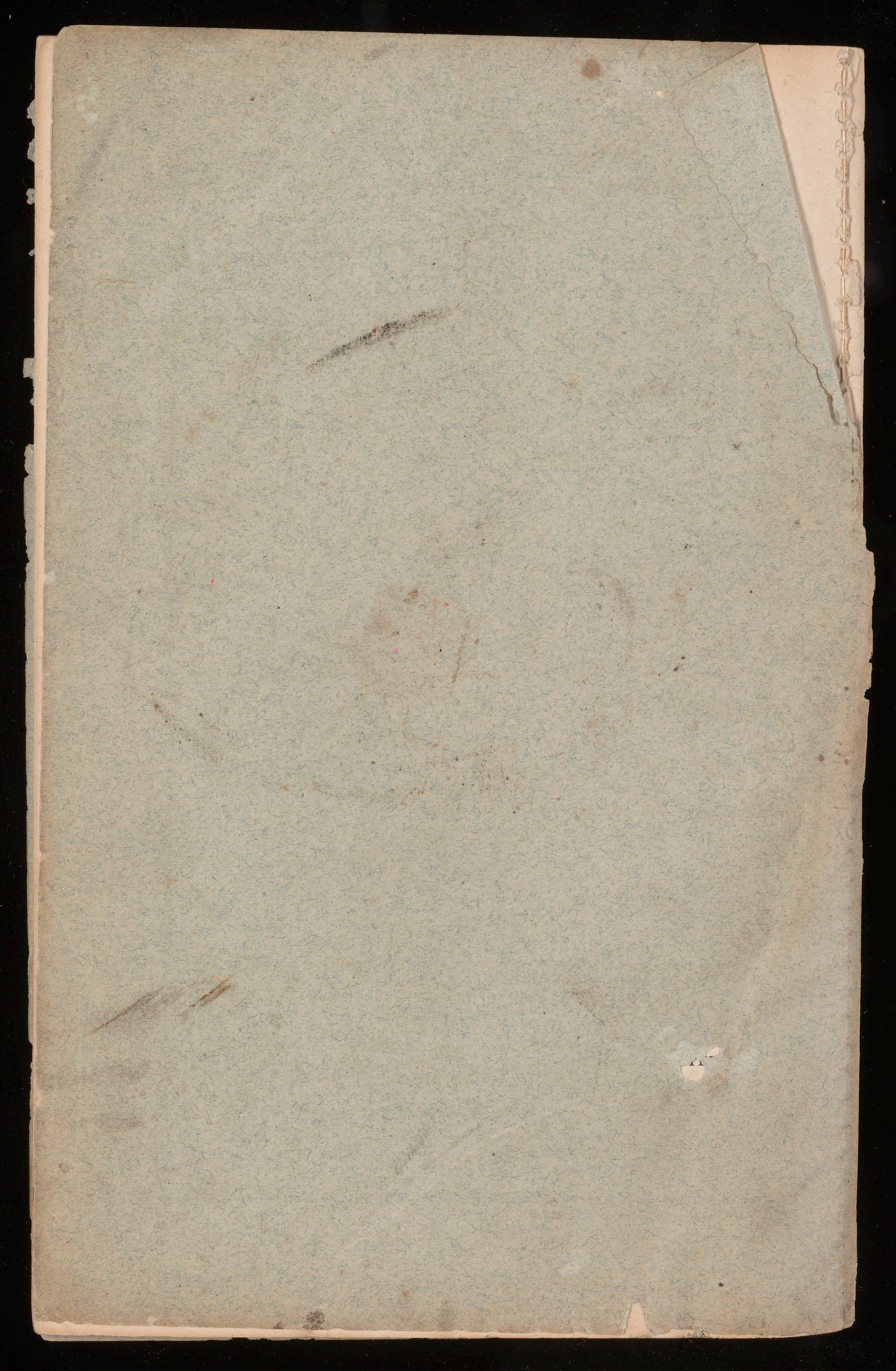RICHMOND COLLEGE.

SESSION 1881-'82.



SESSION 1881-'82.

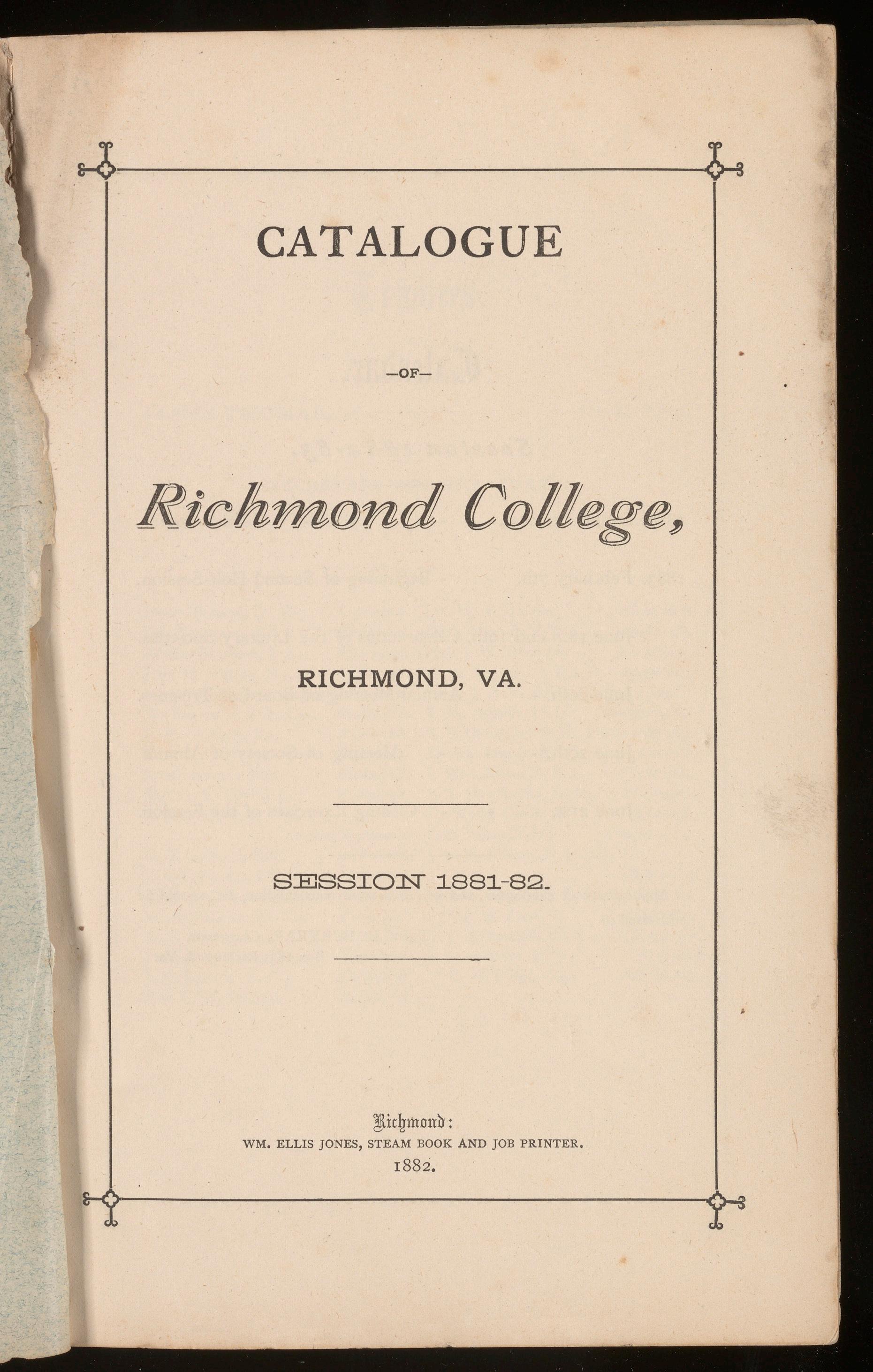
SESSION 1881-82.
Jic!Jrttonh: WM, ELLIS JONES, STEAM BOOK AND JOB PRINTER, 1882.
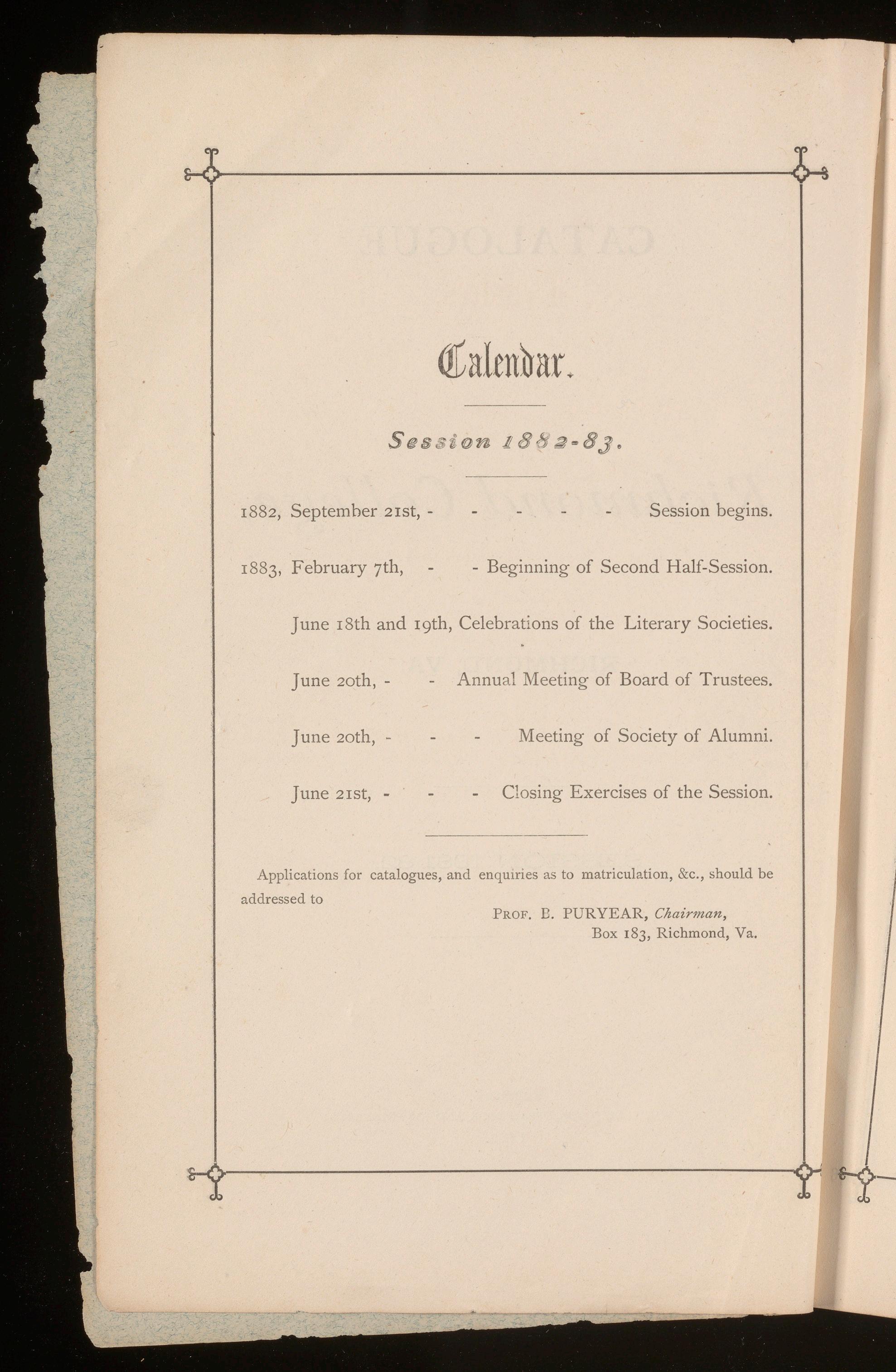
1882, September 21st, - Session begins.
1883, February 7th, -Beginning of Second Half-Session.
June 18th and 19th, Celebrations of the Literary Societies.
June 20th, - Annual Meeting of Board of Trustees.
June 20th, - Meeting of Society of Alumni.
June 21st, - Closing Exercises of the Session.
Applications for catalogues, and en q mries as to matriculation, &c., should be addressed to
PROF. Il. PURYEAR, Chairman, Box 183, Richmond, Va.
PRESIDENT,
JAMES THOMAS, Jr., Richmond.
SECRETARY AND TREASURER.
Rev. C. H. RYLAND,
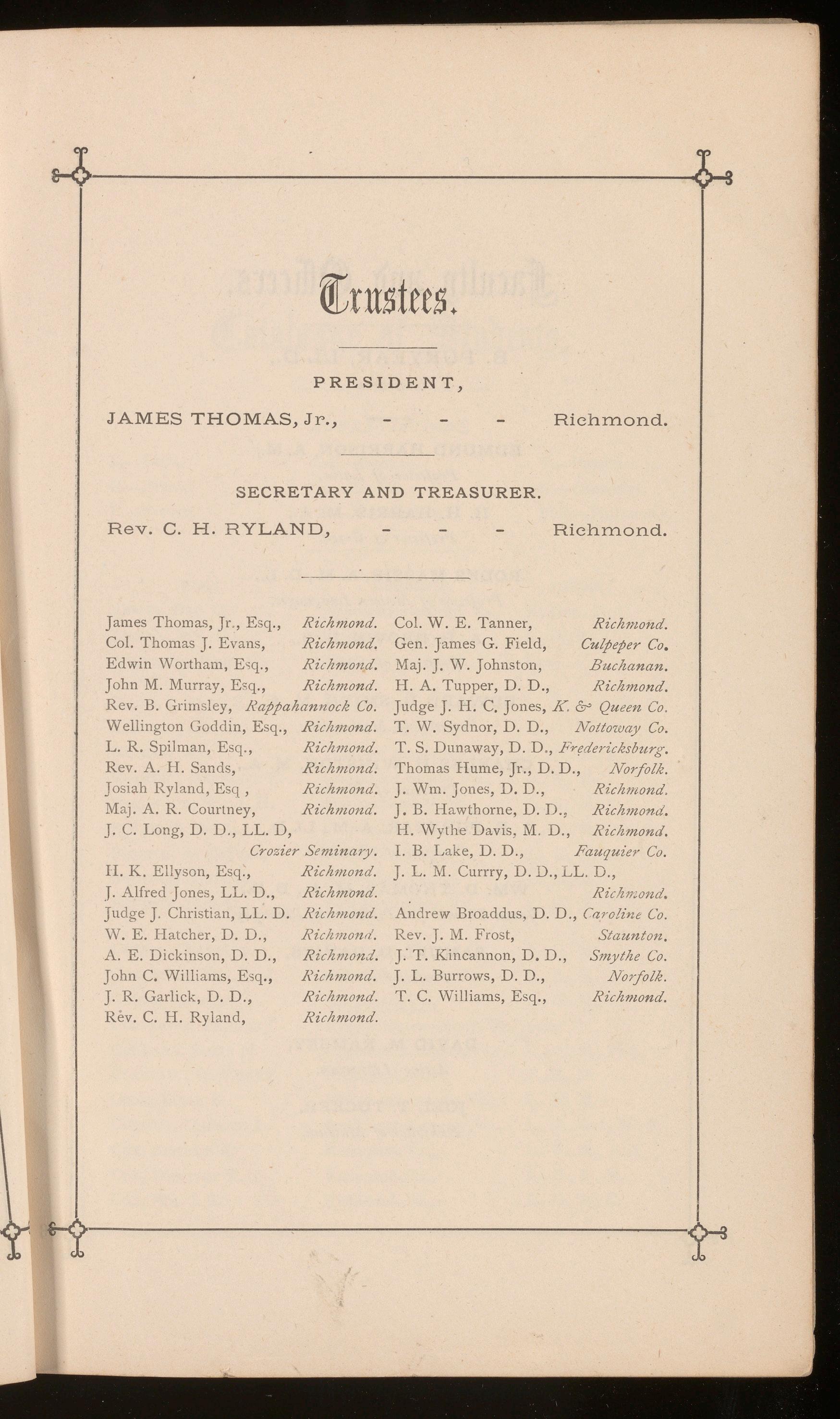
Richmond.
James Thomas, Jr., Esq., Richmond.
Col. Thomas J. Evans, Richmond.
Edwin Wortham, E,q., Richmond.
John M. Murray, Esq., Richmond.
Rev. B. Grimsley, Rappahannock Co.
Wellington Goddin, Esq., Ricltmond.
L. R. Spilman, Esq., Riclimond.
Rev. A. H. Sands, Richmond.
Josiah Ryland, Esq, Richmond.
Maj. A. R. Courtney, Richmond.
J. C. Long, D. D., LL. D, Crozier Semina,,-y.
II. K. Ellyson , Esq., Ricltmond.
J. Alfred Jones, LL. D., Richmond.
Judge J. Christian, LL. D. Richmond.
W. E. Hatcher, D. D., Ricltmonrl.
A. E. Dickinson, D. D., Richmond.
John C. Williams, Esq., Richmond.
J. R. Garlick, D. D., Richmond.
Rev. C. H. Ryland, Richmond.
Col. W. E. Tanner, Richmond.
Gen. James G. Field, Culpeper Co.
Maj. J. W. Johnston, Buchanan. H. A. Tupper, D. D., Richmond.
Judge J. H. C. Jones, .K. & Queen Co.
T. W. Sydnor, D. D., Nottoway Co.
T. S. Dunaway, D. D., .Frede,,-icksburg.
Thomas Hume, Jr., D. D., Norfolk.
J. Wm. Jones, D. D., Richmond
J.B. Hawthorne, D. D., Richmond.
H. Wythe Davis, M D., Richmond.
I. B. Lake, D. D., Fauquie,· Co.
J. L. M. Currry, D. D., LL. D., Rich1tcond.
Andrew Broaddus, D. D., {'a,·o!ine Co.
Rev. J. M. Frost, Staunton. f T. Kincannon, D. D., Smythe Co.
J. L. Burrows, D. D., Norfolk.
T. C. Williams, Esq., Richmond.
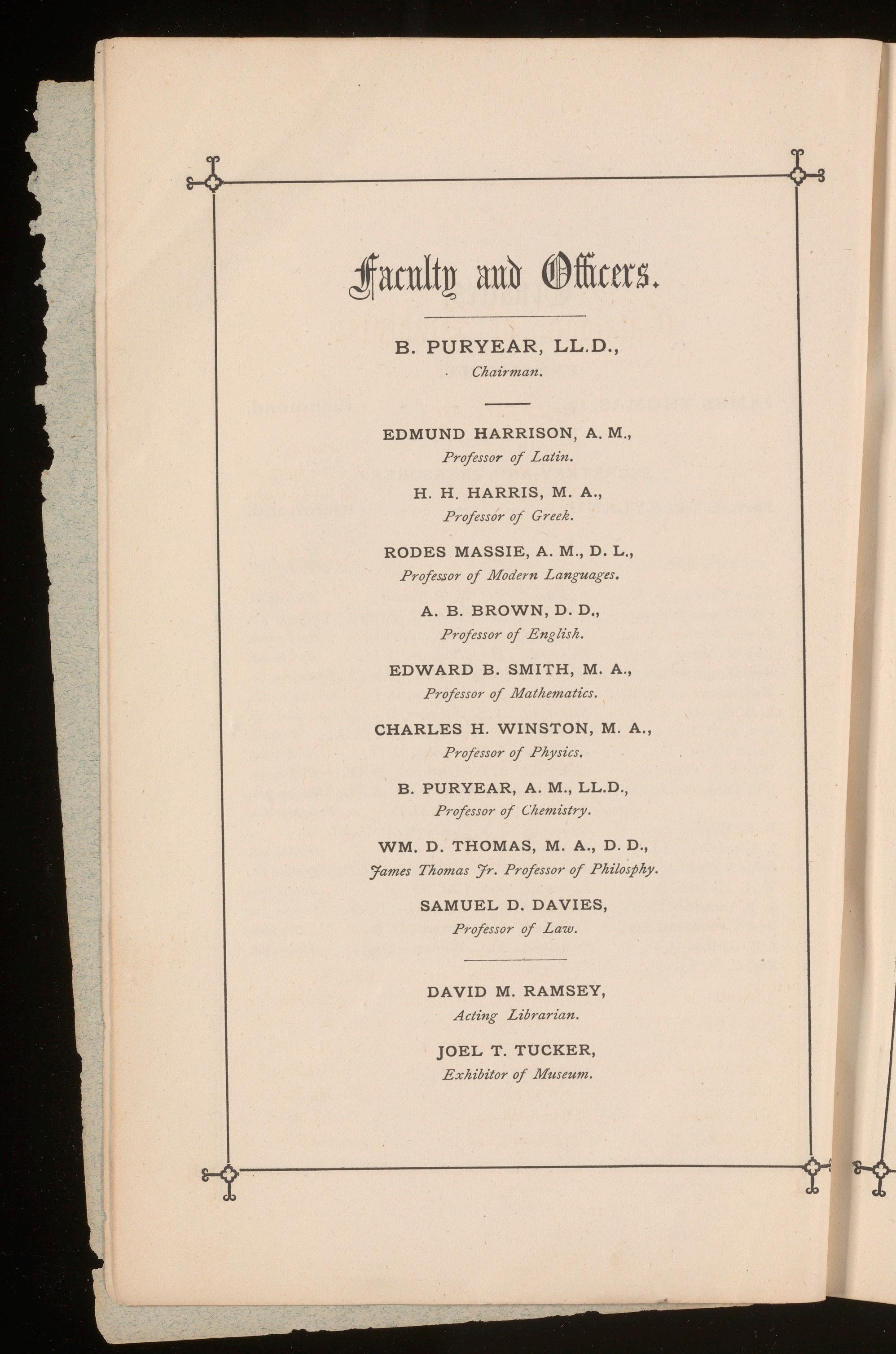
B. PURYEAR , LL.D. , Chairman.
EDMUND HARRISON , A . M ., Professor of L atin.
H . H . HARRIS , M . A ., Professor of Greek.
RODES MASSIE , A. M ., D. L ., Profes.sor of Modern Languages
A. B. BROWN , D . D. , Professor of English.
EDWARD B SMI T H , M . A ., Professor of Mathematics.
CHARLES H. WINSTON , M . A ., Professor of Physics,
B . PURYEAR , A. M ., LL.D ., Professor of Cltemistry.
WM . D THOMAS , M . A ., D D ., '.James Thomas :Jr. Professor of Philosphy.
SAMUE L D. DAVIES , Professor of Law.
DAVID M. RAMSEY , Acting L ibrarian.
JOEL T . TUCKER , Exhibitor of Museum.
L.-Latin.
G.-Greek.
F.-French.
ABB RE VIA TIONS.
Ger.-German.
E.-English. M.-Mathematics.
NAME.
ABBITT,GEO. C. ANCELL,WM. H. ANDERSON,THOS. M.
BAGBY,LUTHER R. BARKER,JOHN A. BARKER,WM. C. BARRETT,HERNDONVI'. BOHANNON,WM. J. H. BORUM,JAMESA. BOSTICK,A. Mc!VER, BROWN,J. LUTHER BUNDICK,GEO. C.
CABELL,CLARENCE
CHEATHAM,JNO, W. L.
CHILD, CHARLES CLUVERIUS,THOMASJ. COLEMAN,JAMESM. COLQUITT,W. HENRY COOK,JAMESB. CORBITT,CHARLESL. Cox, ARTHUR E. Cox, HERBERT F. Cox, WM. J. E.
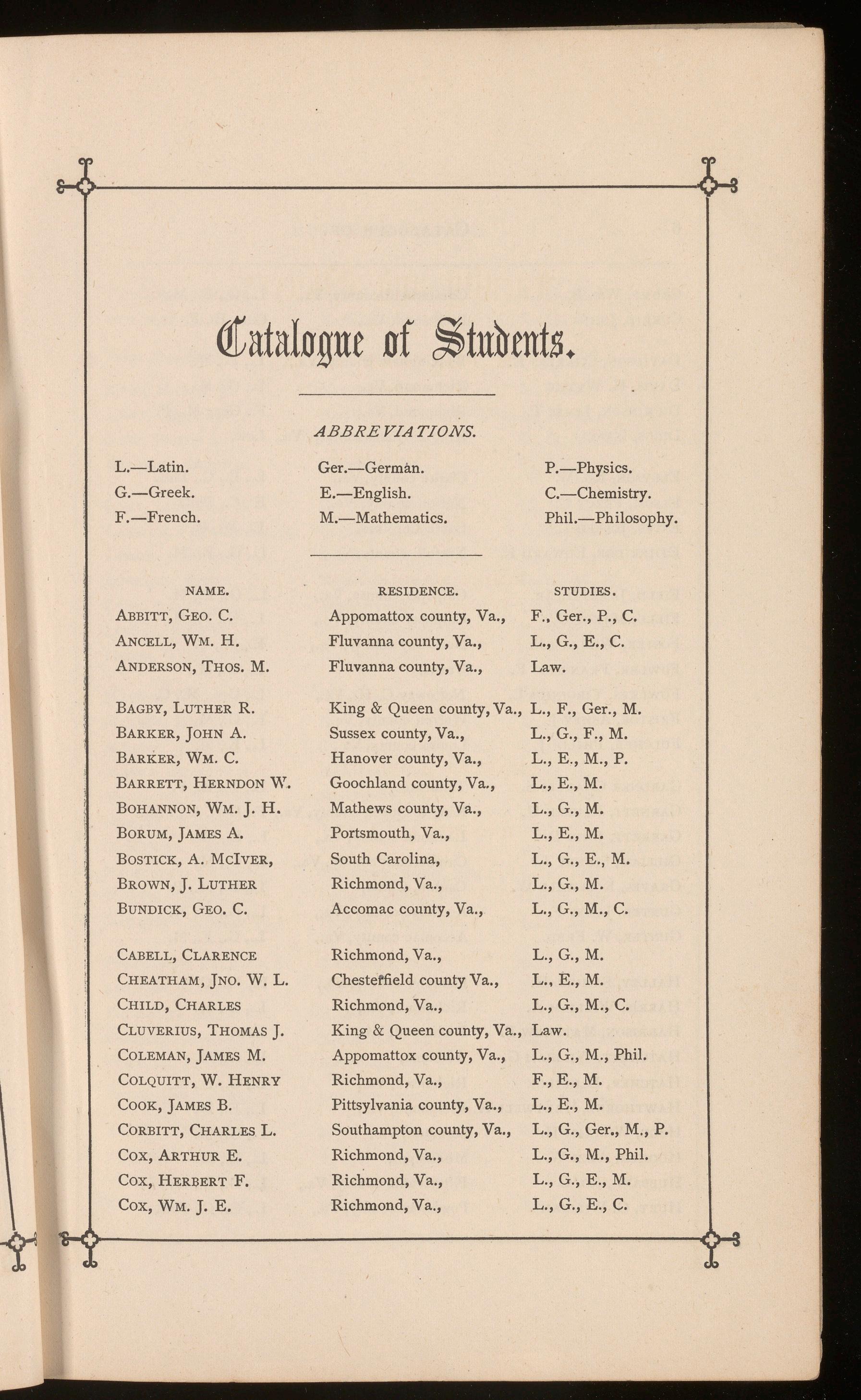
RESIDENCE.
Appomattox county, Va., Fluvanna county, Va., Fluvanna county, Va.,
King & Queen county, Va., Sussex county, Va., Hanover county, Va., Goochland county, Va., Mathews county, Va., Portsmouth, Va., South Carolina, Richmond, Va., Accomac county, Va., Richmond, Va., Chesterfield county Va., Richmond, Va., King & Queen county, Va., Appomattox county, Va., Richmond, Va., Pittsylvania county, Va., Southampton county, Va., Richmond, Va., Richmond, Va., Richmond, Va.,
P.-Physics. C.-Chemistry. Phil.-Ph ilosophy.
STUDIES.
F., Ger., P., C. L.,G.,E.,C. Law.
L., F., Ger., M. L.,G.,F.,M. L.,E.,M.,P. L.,E.,M. L.,G.,M. L., E., M. L.,G.,E.,M. L., G., M. L., G., M., C. L.,G., M. L., E., M. L.,G.,M.,C. Law.
L., G., M., Phil. F.,E., M. L.,E.,M. L., G., Ger,, M., P. L., G., M., Phil. L.,G.,E.,M. L.,G.,E.,C.
CRUMP,WM. B.
CURRIE, JOHN
DAVIDSON,CHARLES E.
DAVIS, H. WYTHE
DICKINSON,JAMEST.
DIGGS, ISAAC
ELLYSON,Ro. M.
ELSOM, PERCY G.
ESTES, JOSEPH L.
ETHERIDGE, EDWARD E.
FIELD, JAMESG., JR.
FIELD, MAXCYG.
FOSTER, WILLIAM B.
FOWLER, FRANCISCOF.
FOWLKES,VIRGINIUSL.
FRISTOE, ASHBYJ.
FULCHER, PHILIP J.
GARDNERCHARLESS.
GARNETT, REUBEN H.
GARRETT, JOHN D.
GILLIAM, SIDNEY L. GRAVES,ROSEWELLW.
GUNTER, JAMES F.
GUNTER, W. FRED.
HALLEY, SAMUELH.
HARRIS, WILLIAM A.
HARRISON, MATTHEW B.
HATCHETT, WILLIAM G.
CATALOGUE OF
Chesterfield county, Va., L., G., E., M. Richmond, Va., Ger., E., P.
Buckingham county, Va., L., E., M. Richmond, Va., L., G., M. Richmond, Va., F., Ger., M., P. King & Queen county, Va., Law.
Clarke county, Va., Nelson county, Va.,
South Carolina, Norfolk county, Va.,
Culpeper county, Va., Culpeper county, Va., Nottoway county, Va., Texas,
Nottoway C. H., Va., Warren county, Va., Louisa county, Va.,
L., E., C., Phil. E., C., Phil. E., M.,P. L., G., E., M. L., G., F., M. L., G., F., M. E.,M.,C. L.,G.,M. L., Ger , M., C. L., G., M. L.,E.,M.
Tennessee, L., G., E., P. King & Queen county, Va., F., Ger., E., Phil. Loudoun county, Va., L., E., M. Cumberland county, Va., L., G., M. Canton, China, L., E., M., P. Accomac county, Va., L., G., F., M. Accomac county, Va., L., G., F., M.
Fauquier county, Va., E., M., C. Richmond, Va., L., G., M. Richmond, Va., Law.
Alabama, L., G., M.
HATCHER, ELDRIDGE Richmond, Va., HAWTHORNE,HARTWELL K. Richmond, Va.,
L., G., E., M. L., E., M. L.,G., M. HOGE, WILLIAM H.
HOOKER, AMZI W. HUBBARD,Ro. C. HURT, G. WILLIAM
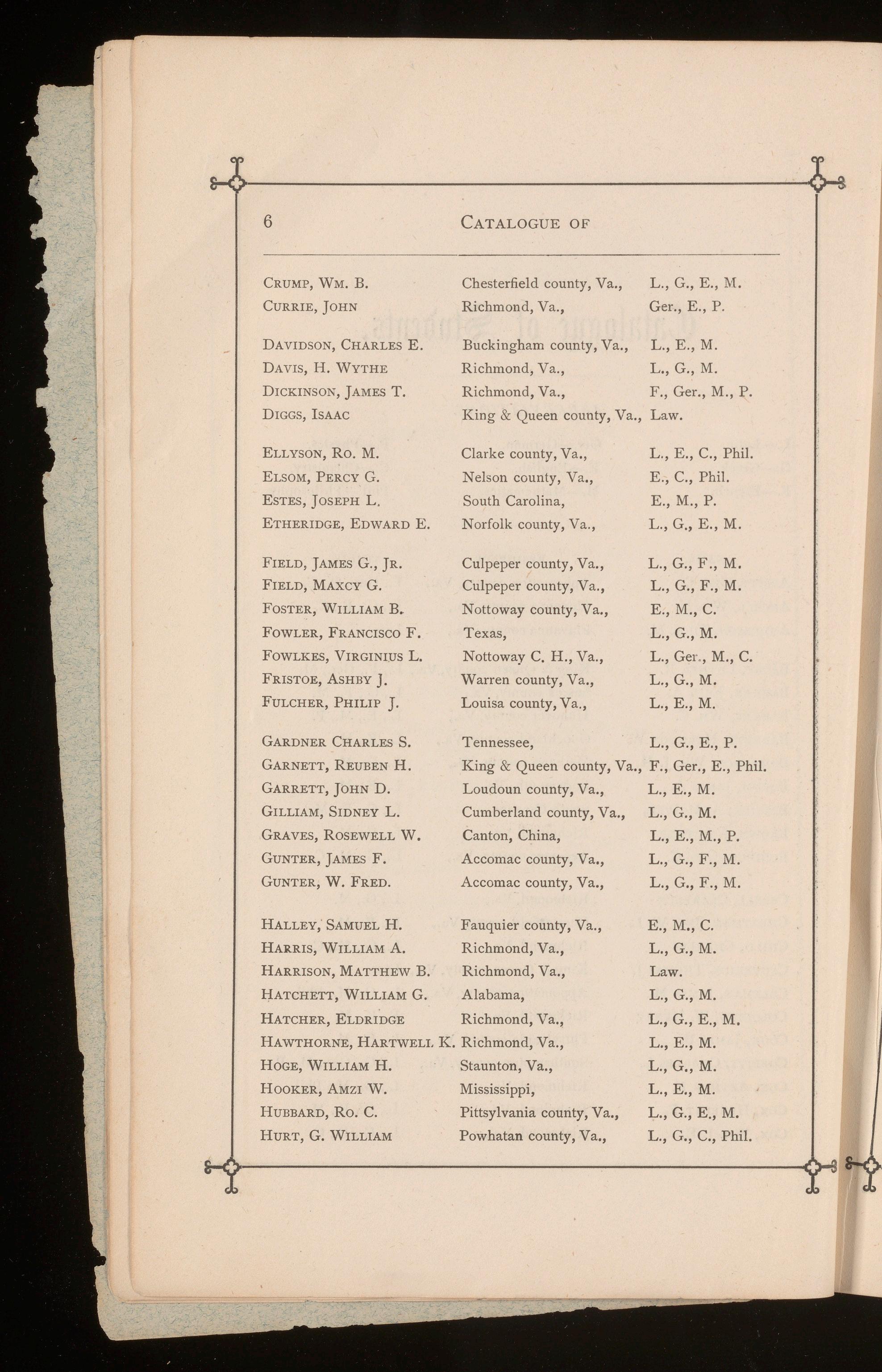
Staunton, Va., Mississippi, Pittsylvania county, Va., Powhatan county, Va., L., E., M. L., G., E., M. L., G., C., Phil.
RICHMOND COLLEGE. 7

HUTCHINGS,WILLIS
Norfolk county, Va., L.,G.,M. HUTCHINGS,LUTHER Norfolk county, Va., L., G., M.
JONES,CARTER H. Richmond, Va., F., C., Phil.
KEMP, HARRY W. Maryland, L., E., M. KENT, OSCARR. Northumberland county,Va., L., E., M. KING, JOSEPH L. Halifax county, Va., L.,G.,M.,C. KNOWLES,IRVIN L. Richmond, Va., L., E., M.
LAKE, JAMESL. Fauquier county, Va., E., M.,P. LATHAM, FAYETTE M., JR. Culpeper county, Va., L., G., Ger., M. LEMON,J.BUNYAN Botetourt county, Va., L., G., M., P. LIPSCOMB,EDGAR Nelson county, Va., L., G., M., P. LONG, JOHN C., JR. Pennsy Ivania, L., C., P. LOVING,JOHN W. Fluvanna county, Va. L., G., E., M. LYONS, WILLIAM H. Richmond, Va., L.,G.,M.
MACFEE, WILLIAM V. Charlotte county, Va., L.,G., M.
MARTIN, JAMESD. Pittsylvania county, Va., L.,E.,M. MARTIN, JOHN B. Chesterfield county, Va., L., E., C. MASSIE, CHARLESA. L. Richmond, Va., L.,G.,M. MATHEWS,W. KIRK Manchester, Va., L., F., Ger. MERCER, WALTER C. Richmond, Va., L., E., M. McKENZIE, TRACY Texas, L., F., Ger., E., M. MONTAGUE,ANDREW J. Middlesex county, Va., L., F., Phil. MORRIS, EDMUNDT. Caroline county, Va., Ger., E., M., C. MORRISS,CHAPMANW. Henrico county, Va., L., E., M. PENDLETON,BALDWINA. Richmond, Va., G., C., Phil. PHILLIPS, HARRY N. Nottoway county, Va., L., G., E., M. PLEASANTS,ARTHUR L. Richmond, Va., L.,F.,E.,M. POLLARD,EDWARD B. Richmond, Va., L.,G.,E.,M. PURYEAR,FRANK Richmond, Va., G., F., Ger., M.
QUICK, GEORGEW. Loudoun county, Va., L., G., E., M. RAMSEY,DAVID M. South Carolina, L., G., M., C. RAMSDELL,JOSHUA D. Chesterfield county, Va. L.,F.,E.,M. REAMS,EDWARD D. Charlotte county, Va., L.,E., M. REDD, JAMEST., JR. Richmond, Va., L.,E., M.
8
RENNIE, JOSEPH
ROBINSON, WILLIAM C.
ROBINSON, CLIFFORD C.
ROBINSON, WIRT
ROGERS, WILBUR V.
ROLLINS, WILLIAM G.
RUDD, A. BARTOW
SANDS, CONWAY R.
SAMPSON, WILLIAM H.
SCOTT, EDWARD L.
SCOTT, JAMES H.
SCOTT, JOSEPH H.
SCOTT, WILLIAM H., JR.,
SELDEN, WILLIAM B.
SETTLE, EDWARD F.
SHEPHERD, JOHNS.
SHUMATE, LUTHER D.
SMITH, HORACE W.
STEARNES, ORREN L.
SUTTON, DAVID, JR.
TABB, FRANK D.
TALLEY, WARREN
TANNER, R. E. L.
THOMAS, WM. R.
THROCKMORTON, C. W.
THORNHILL, WILLIAM B.
THORNTON, WILLIAM W.
TIMBERLAKE, lVISON B.
TRIBBLE, HENRY W.
TUCKER, JOEL T.
TUCKER, R. ATWELL
TUCKER, Ro. D.
VEST, JOHN G.
WADDY, ASHBY
WALDROP, EMMETT, L.
CATALOGUE OF
Richmond, Va., Sussex county, Va., Richmond, Va., Richmond, Va., South Carolina, South Carolina, Chesterfield county, Va., Richmond, Va., Alexandria, Va., Louisiana, Richmond, Va., Essex county, Va., Richmond, Va., Hampton, Va., Culpeper county, Va., Fluvanna county, Va.,
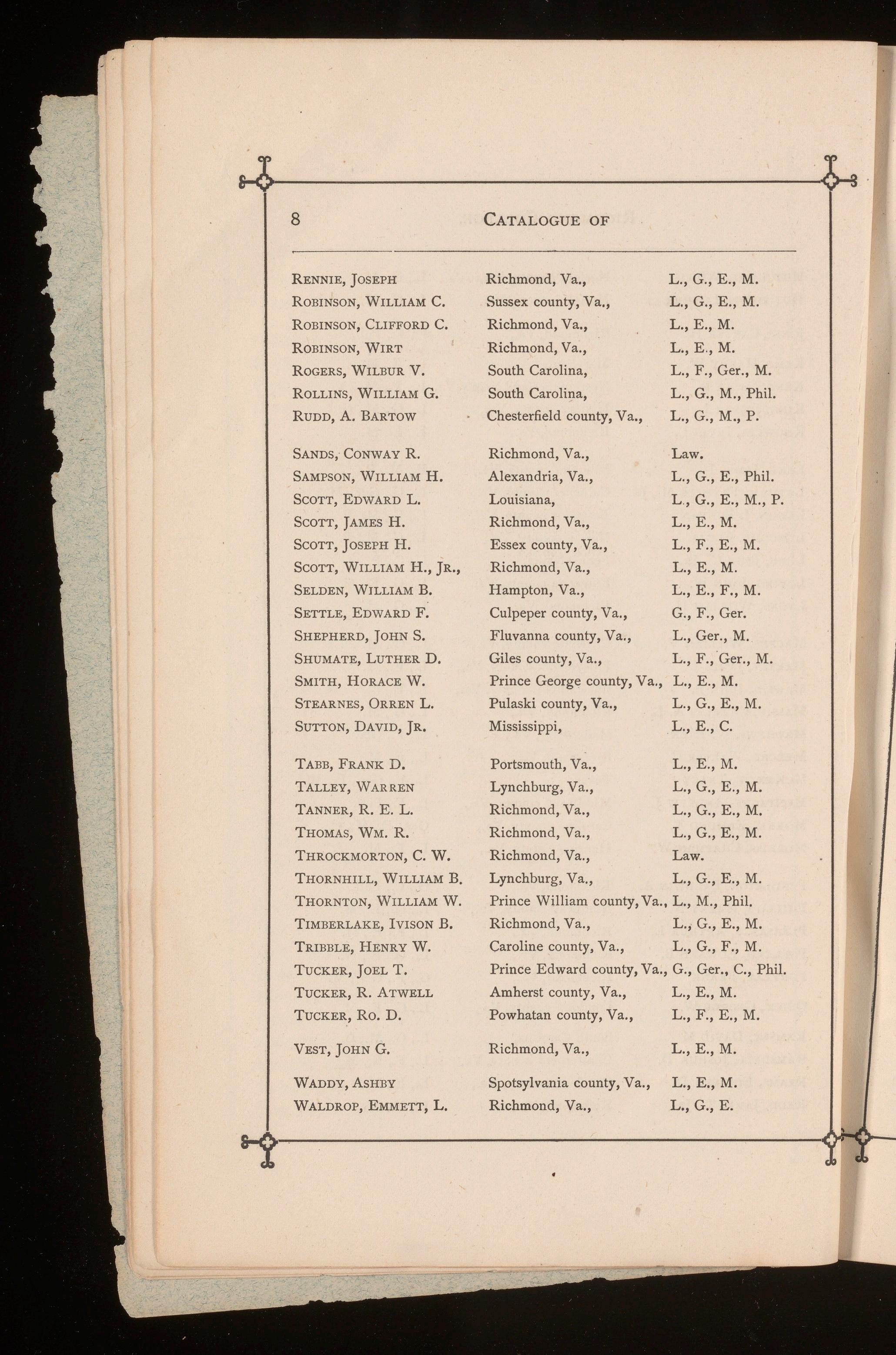
L.,G.,E.,M. L.,G.,E.,M. L.,E., M. L., E., M. L., F., Ger., M. L., G., M., Phil. L., G., M., P. Law.
L., G., E., Phil. L., G., E., M., P. L., E., M. L., F., E., M. L., E., M. L.,E.,F.,M. G., F., Ger. L., Ger., M. Giles county, Va., L., F., Ger., M.
Prince George county, Va., L., E., M. Pulaski county, Va., L., G., E., M. Mississippi, L., E., C.
Portsmouth, Va., Lynchburg, Va., Richmond, Va., Richmond, Va., Richmond, Va., Lynchburg, Va., L., E., M. L.,G.,E.,M. L.,G.,E.,M. L., G., E., M. Law. L.,G.,E.,M.
Prince William county, Va., L., M., Phil. Richmond, Va., L.,G.,E.,M.
Caroline county, Va., L., G., F., M.
Prince Edward county, Va., G., Ger., C., Phil. Amherst county, Va., L., E., M.
Powhatan county, Va., L., F., E., M.
Richmond, Va., L., E., M.
Spotsylvania county, Va., L., E , M. Richmond, Va., L., G., E.
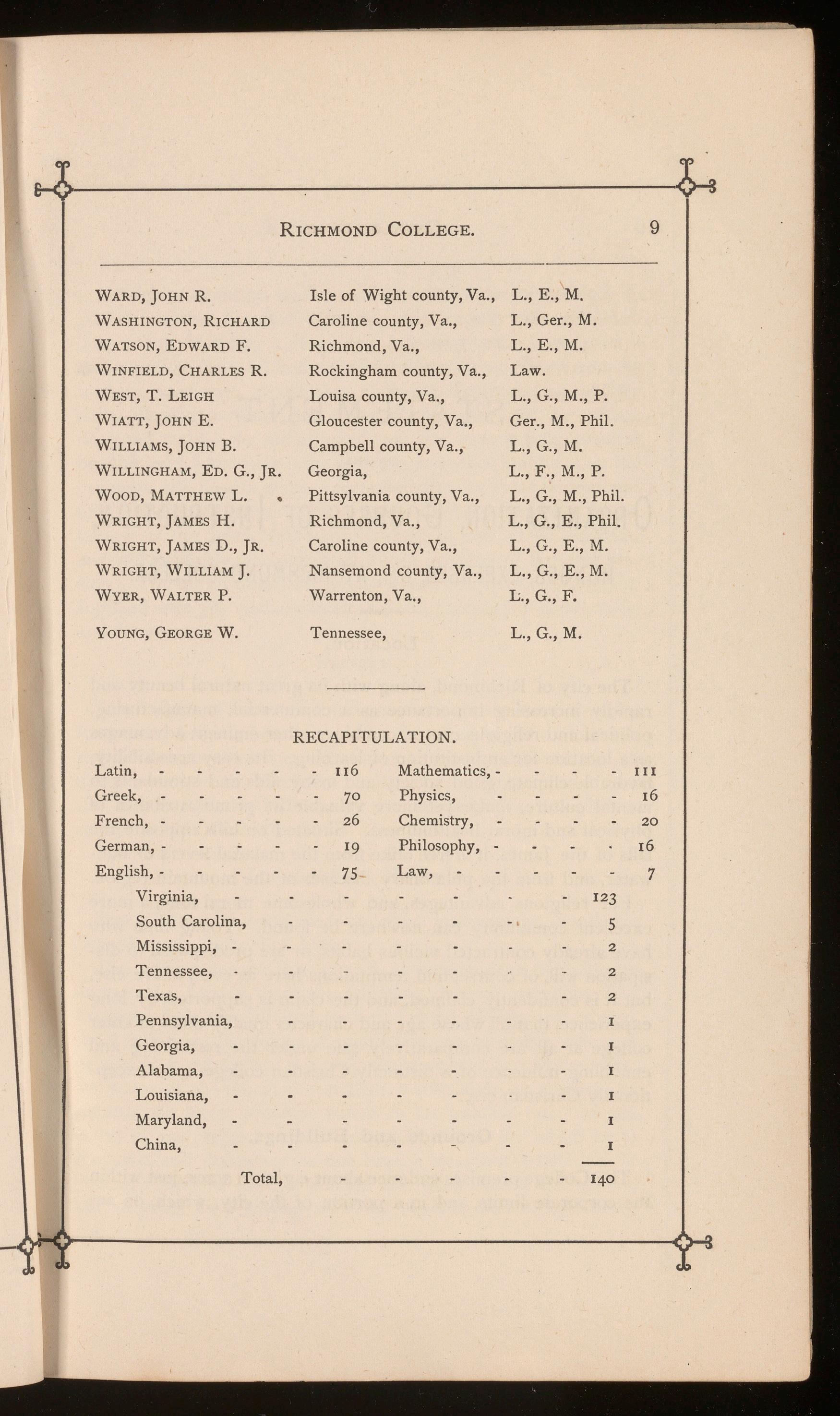
WARD, JOHN R.
WASHINGTON,RICHARD
WATSON,EDWARDF.
WINFIELD, CHARLESR.
WEST, T. LEIGH
WIATT, JOHN E.
WILLIAMS,JOHN B.
WILLINGHAM,ED. G., JR.
WOOD, MATTHEWL.
WRIGHT, JAMESH.
WRIGHT, JAMESD., JR.
WRIGHT, WILLIAM J.
WYER, WALTER P.
YOUNG,GEORGEW. Latin, Greek, French, German,English,Virginia, South Carolina, Mississippi, Tennessee, Texas, Pennsylvania, Georgia, Alabama, Louisiana, Maryland, China, Total,
RICHMOND COLLEGE.
Isle of Wight county, Va., Caroline county, Va., Richmond, Va., Rockingham county, Va., Louisa county, Va., Gloucester county, Va., Campbell county, Va., Georgia, Pittsylvania county, Va., Richmond, Va., Caroline county, Va., Nansemond county, Va., Warrenton, Va.,
Tennessee, RECAPITULATION.
116 Mathematics,70 Physics, 26 Chemistry, 19 Philosophy, 75 Law,
L., E., M. L., Ger., M. L., E., M. Law.
L., G., M., P. Ger., M., Phil. L.,G.,M.
L., F., M., P. L., G., M., Phil. L., G., E., Phil. L., G., E., M. L.,G.,E.,M. L.,G.,F.
L.,G., M.
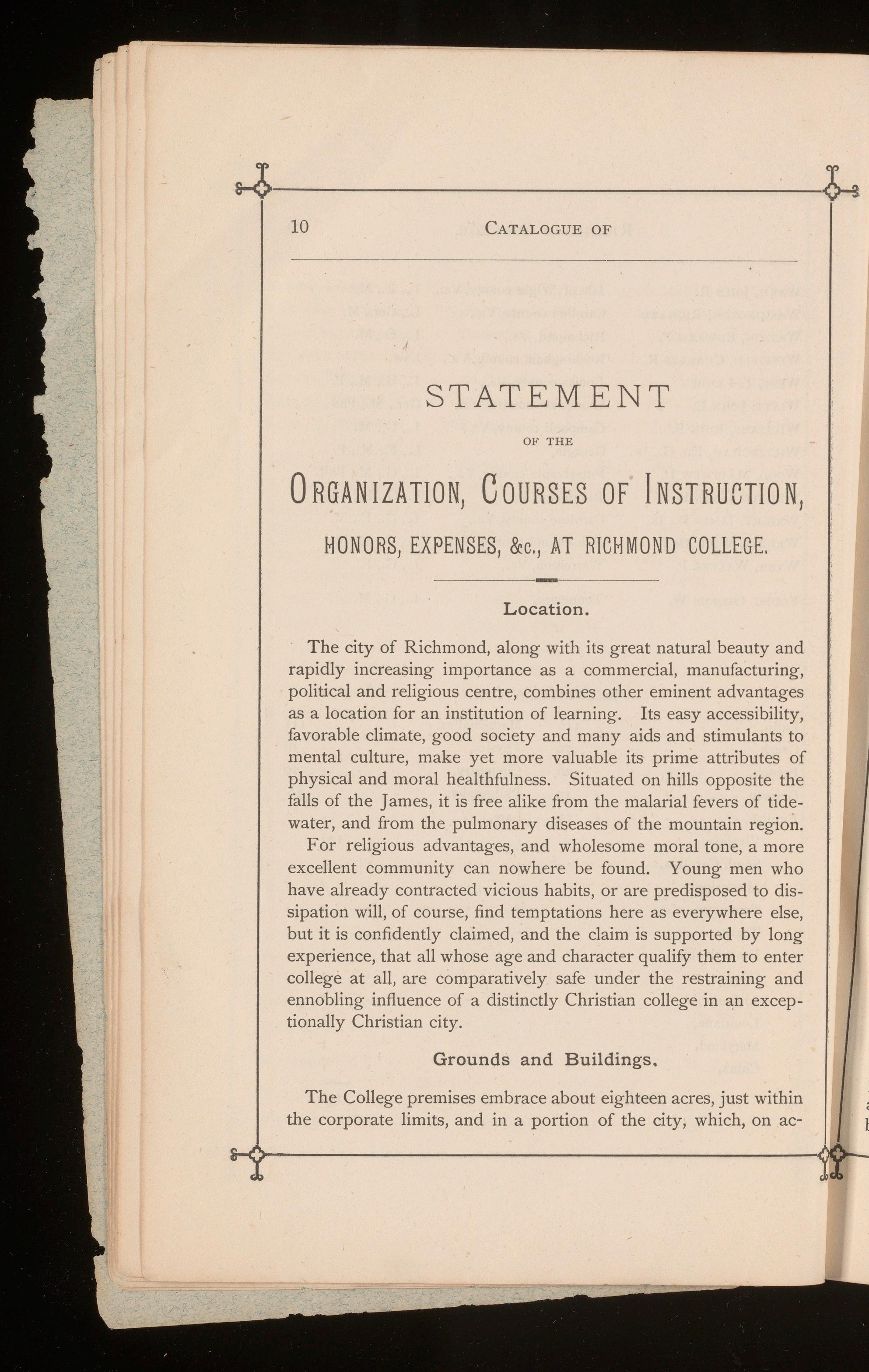
The city of Richmond, along with its great natural beauty and rapidly increasing importance as a commercial, manufacturing, political and religious centre, combines other eminent advantages as a location for an institution of learning. Its easy accessibility, favorable climate, good society and many aids and stimulants to mental culture, make yet more valuable its prime attributes of physical and moral healthfulness. Situated on hills opposite the falls of the James, it is free alike from the malarial fevers of tidewater, and from the pulmonary diseases of the mountain region.
For religious advantages, and wholesome moral tone, a more excellent community can nowhere be found. Young men who have already contracted vicious habits, or are predisposed to dissipation will, of course, find temptations here as everywhere else, but it is confidently claimed, and the claim is supported by long experience, that all whose age and character qualify them to enter college at all, are comparatively safe under the restraining and ennobling influence of a distinctly Christian college in an exceptionally Christian city.
The College premises embrace about eighteen acres, just within the corporate limits, and in a portion of the city, which, on ac-
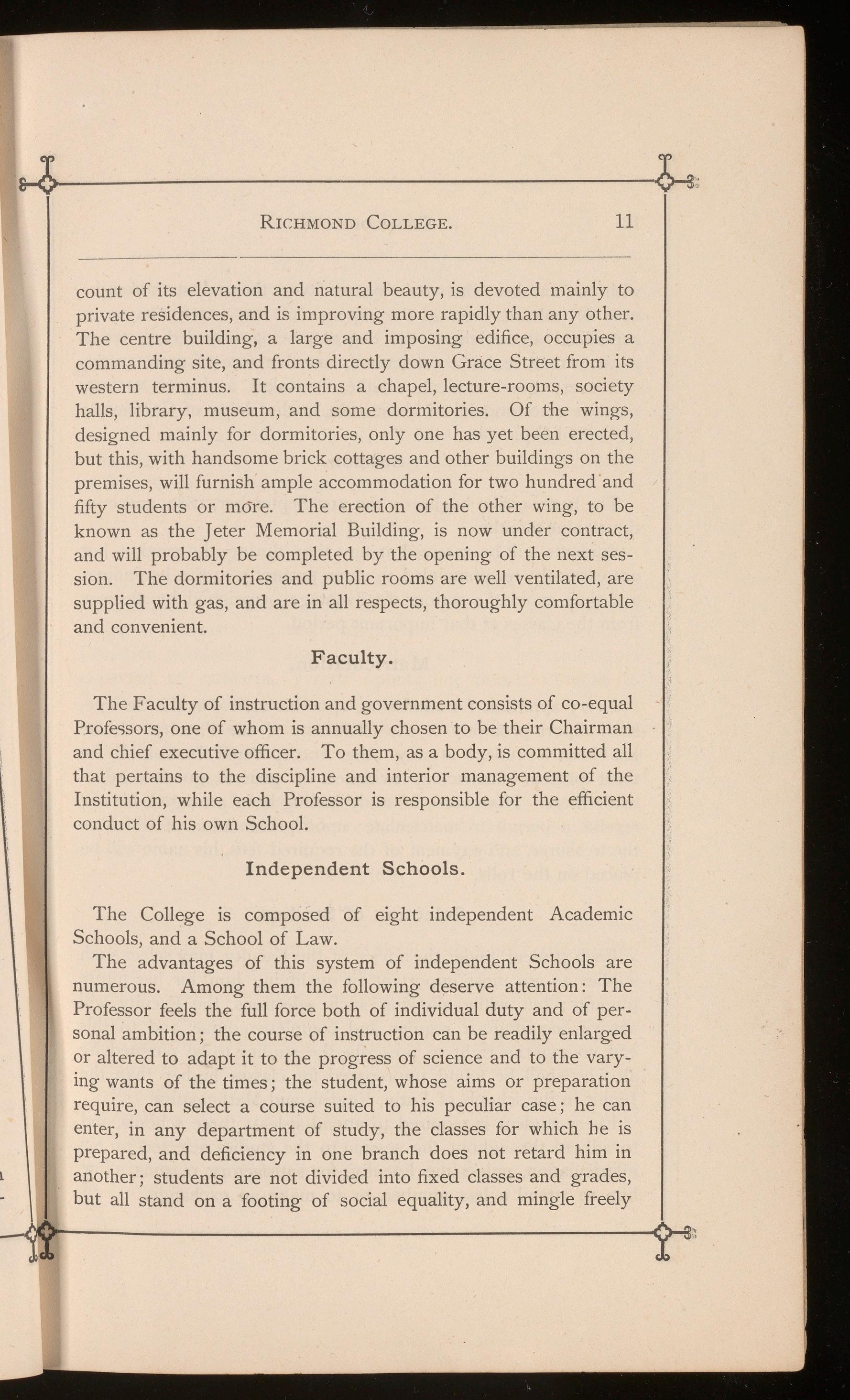
RICHMOND COLLEGE.
count of its elevation and natural beauty, is devoted mainly to private residences, and is improving more rapidly than any other. The centre building, a large and imposing edifice, occupies a commanding site, and fronts directly down Grace Street from its western terminus. It contains a chapel, lecture-rooms, society halls, library, museum, and some dormitories. Of the wings, designed mainly for dormitories, only one has yet been erected, but this, with handsome brick cottages and other buildings on the premises, will furnish ample accommodation for two hundred and fifty students or more. The erection of the other wing, to be known as the Jeter Memorial Building, is now under contract, and will probably be completed by the opening of the next session. The dormitories and public rooms are well ventilated, are supplied with gas, and are in all respects, thoroughly comfortable and convenient.
The Faculty of instruction and government consists of co-equal Professors, one of whom is annually chosen to be their Chairman and chief executive officer. To them, as a body, is committed all that pertains to the discipline and interior management of the Institution, while each Professor is responsible for the efficient conduct of his own School.
The College is composed of eight independent Academic Schools, and a School of Law.
The advantages of this system of independent Schools are numerous. Among them the following deserve attention: The Professor feels the full force both of individual duty and of personal ambition; the course of instruction can be readily enlarged or altered to adapt it to the progress of science and to the varying wants of the times; the student, whose aims or preparation require, can select a course suited to his peculiar case; he can enter, in any department of study, the classes for which he is prepared, and deficiency in one branch does not retard him in another; students are not divided into fixed classes and grades, but all stand on a footing of social equality, and mingle freely
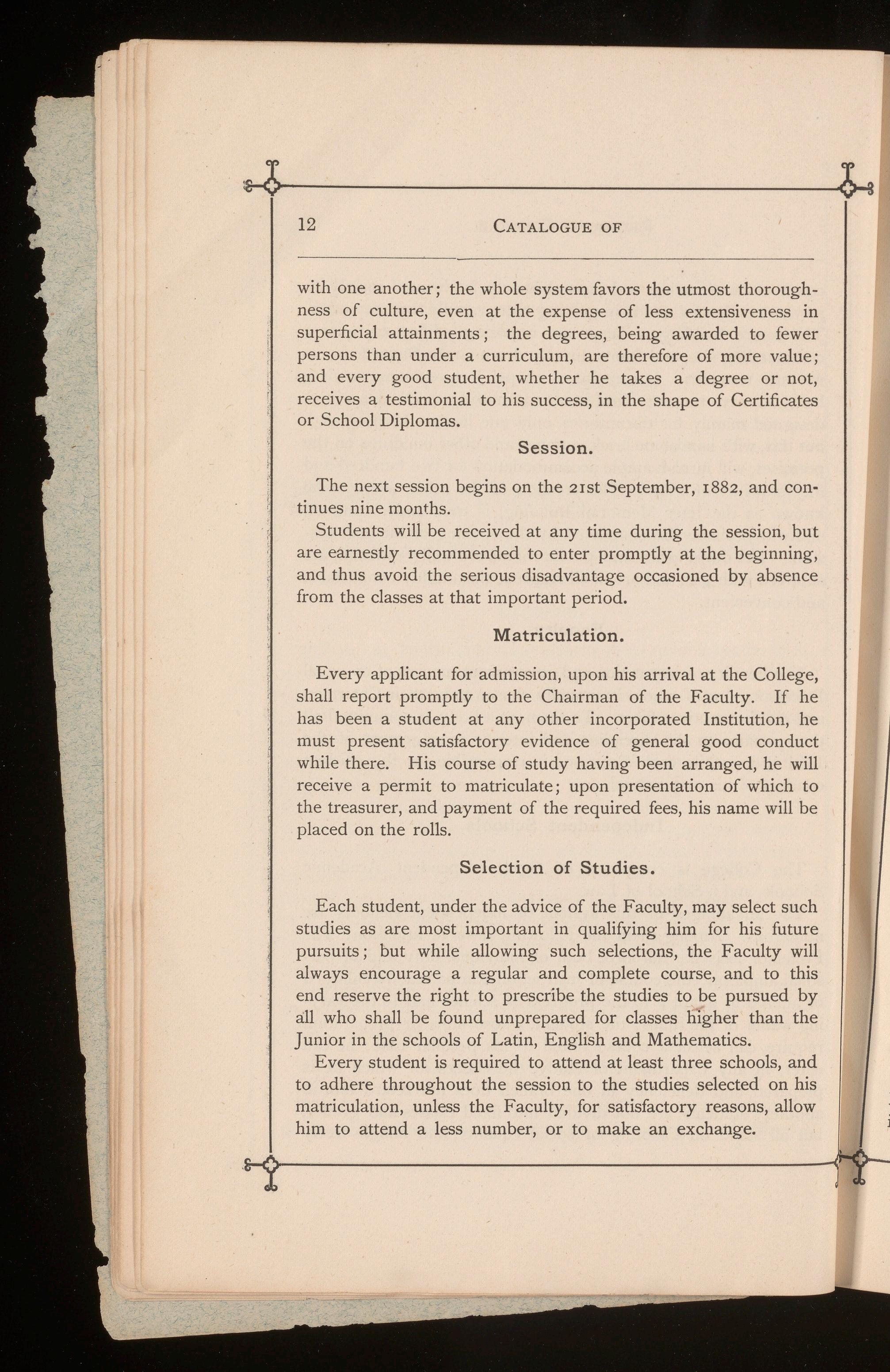
with one another; the whole system favors the utmost thoroughness of culture, even at the expense of less extensiveness in superficial attainments ; the degrees, being awarded to fewer persons than under a curriculum, are therefore of more value; and every good student, whether he takes a degree or not, receives a testimonial to his success, in the shape of Certificates or School Diplomas.
The next session begins on the 21st September, 1882, and continues nine months.
Students will be received at any time during the session , but are earnestly recommended to enter promptly at the beginning, and thus avoid the serious disadvantage occasioned by absence from the classes at that important period.
Matriculation.
Every applicant for admission, upon his arrival at the College, shall report promptly to the Chairman of the Faculty. If he has been a student at any other incorporated Institution, he must present satisfactory evidence of general good conduct while there. His course of study having been arranged, he will receive a permit to matriculate; upon presentation of which to the treasurer, and payment of the required fees, his name will be placed on the rolls.
Each student, under the advice of the Faculty, may select such studies as are most important in qualifying him for his future pursuits; but while allowing such selections, the Faculty will always encourage a regular and complete course, and to this end reserve the right to prescribe the studies to be pursued by all who shall be found unprepared for classes nigher than the Junior in the schools of Latin, English and Mathematics.
Every student is required to attend at least three schools, and to adhere throughout the session to the studies selected on his matriculation, unless the Faculty, for satisfactory reasons, allow him to attend a less number, or to make an exchange.
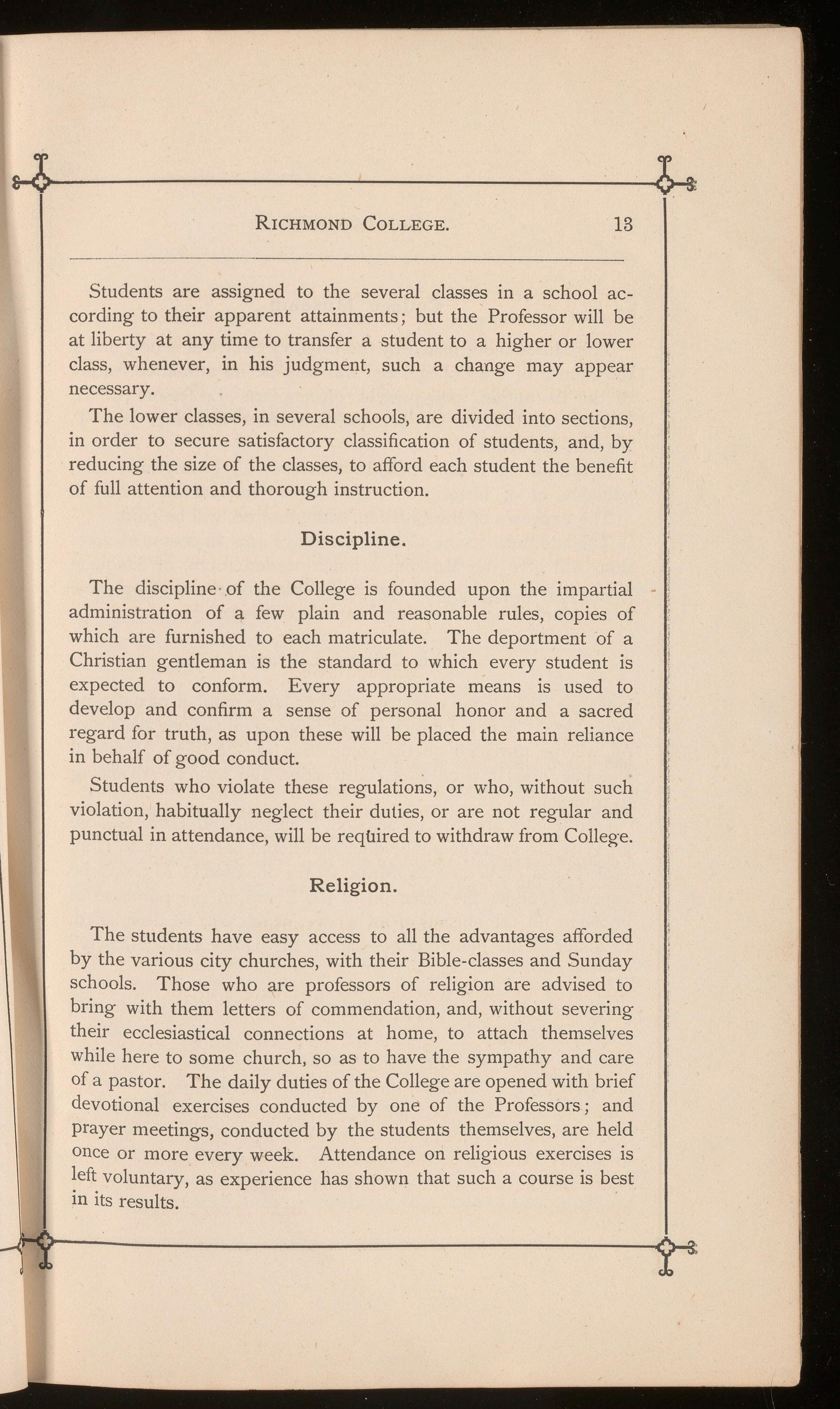
Students are assigned to the several classes in a school according to their apparent attainments ; but the Professor will be at liberty at any time to transfer a student to a higher or lower class, whenever, in his judgment, such a change may appear necessary.
The lower classes, in several schools, are divided into sections, in order to secure satisfactory classification of students, and, by reducing the size of the classes, to afford each student the benefit of full attention and thorough instruction.
The discipline · of the College is founded upon the impartial administration of a few plain and reasonable rules, copies of which are furnished to each matriculate. The deportment of a Christian gentleman is the standard to which every student is expected to conform. Every appropriate means is used to develop and confirm a sense of personal honor and a sacred regard for truth, as upon these will be placed the main reliance in behalf of good conduct.
Students who violate these regulations, or who, without such violation, habitually neglect their duties, or are not regular and punctual in attendance, will be required to withdraw from College.
The students have easy access to all the advantages afforded by the various city churches, with their Bible-classes and Sunday schools. Those who are professors of religion are advised to bring with them letters of commendation, and, without severing their ecclesiastical connections at home, to attach themselves while here to some church, so as to have the sympathy and care of a pastor . The daily duties of the College are opened with brief devotional exercises conducted by one of the Professors; and prayer meetings, conducted by the students themselves, are held once or more every week. Attendance on religious exercises is left voluntary, as experience has shown that such a course is best in its results.
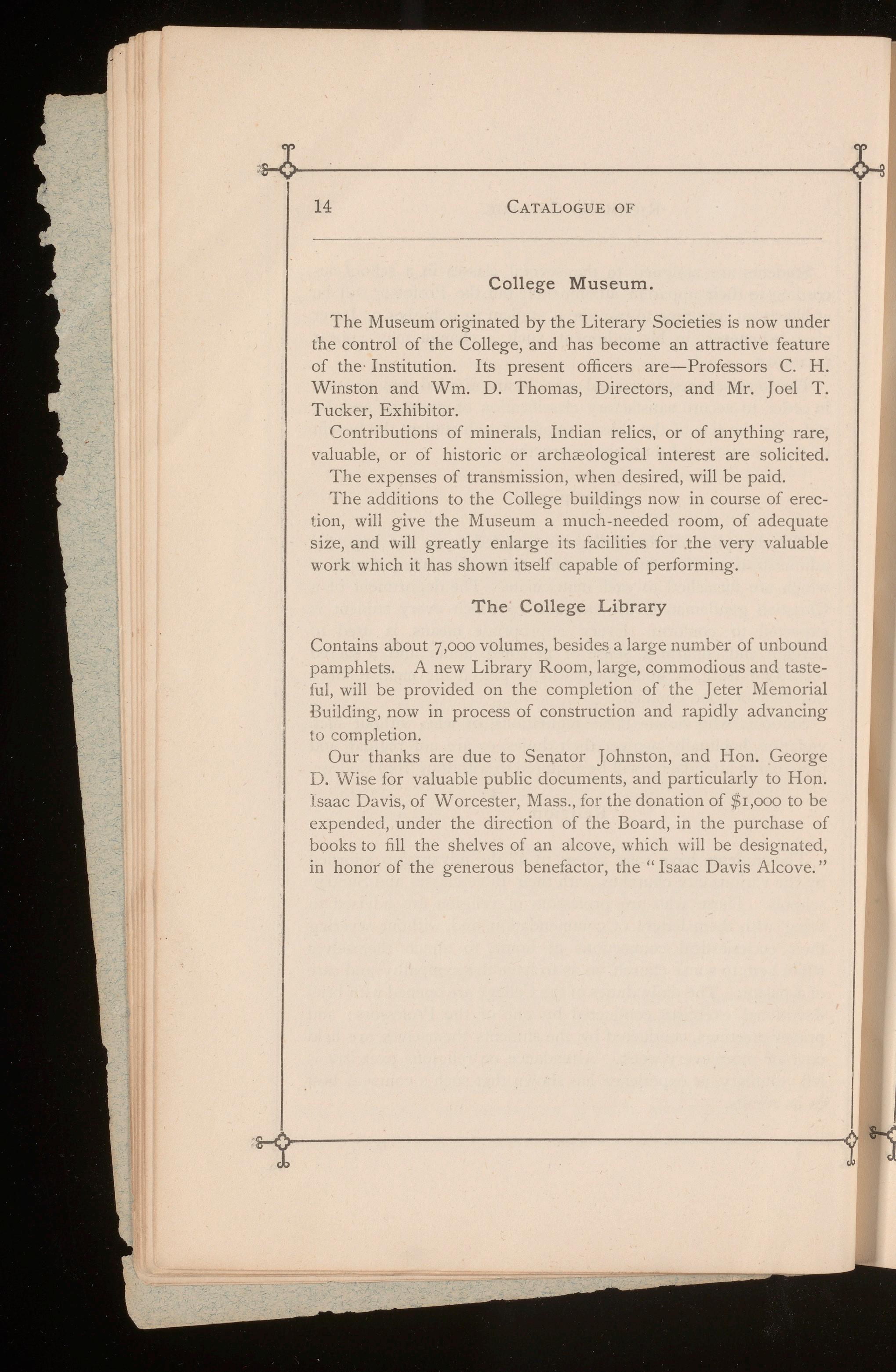
The Museum originated by the Literary Societies is now under the control of the College, and has become an attractive feature of the· Institution. Its present officers are-Professors C. H. Winston and Wm. D. Thomas, Directors, and Mr. Joel T. Tucker, Exhibitor.
Contributions of minerals, Indian relics, or of anything rare, valuable, or of historic or archceological interest are solicited.
The expenses of transmission, when desired, will be paid.
The additions to the College buil dings now in course of erection, will give the Museum a much-needed room, of adequate size, and will greatly enlarge its facilities for the very valuable work which it has shown itself capable of performing.
Contains about 7,000 volumes, besides a large number of unbound pamphlets. A new Library Room, large, commodious and tasteful, will be provided on the completion of the Jeter Memorial Building, now in process of construction and rapidly advancing to completion.
Our thanks are due to Senator Johnston, and Hon. George D. Wise for valuable public documents, and particularly to Hon. lsaac Davis, of Worcester, Mass., for the donation of $1,000 to be expended, under the direction of the Board, in the purchase of books to fill the shelves of an alcove, which will be designated, in honor of the generous benefactor, the "Isaac Davis Alcove."
RICHMOND COLLEGE.
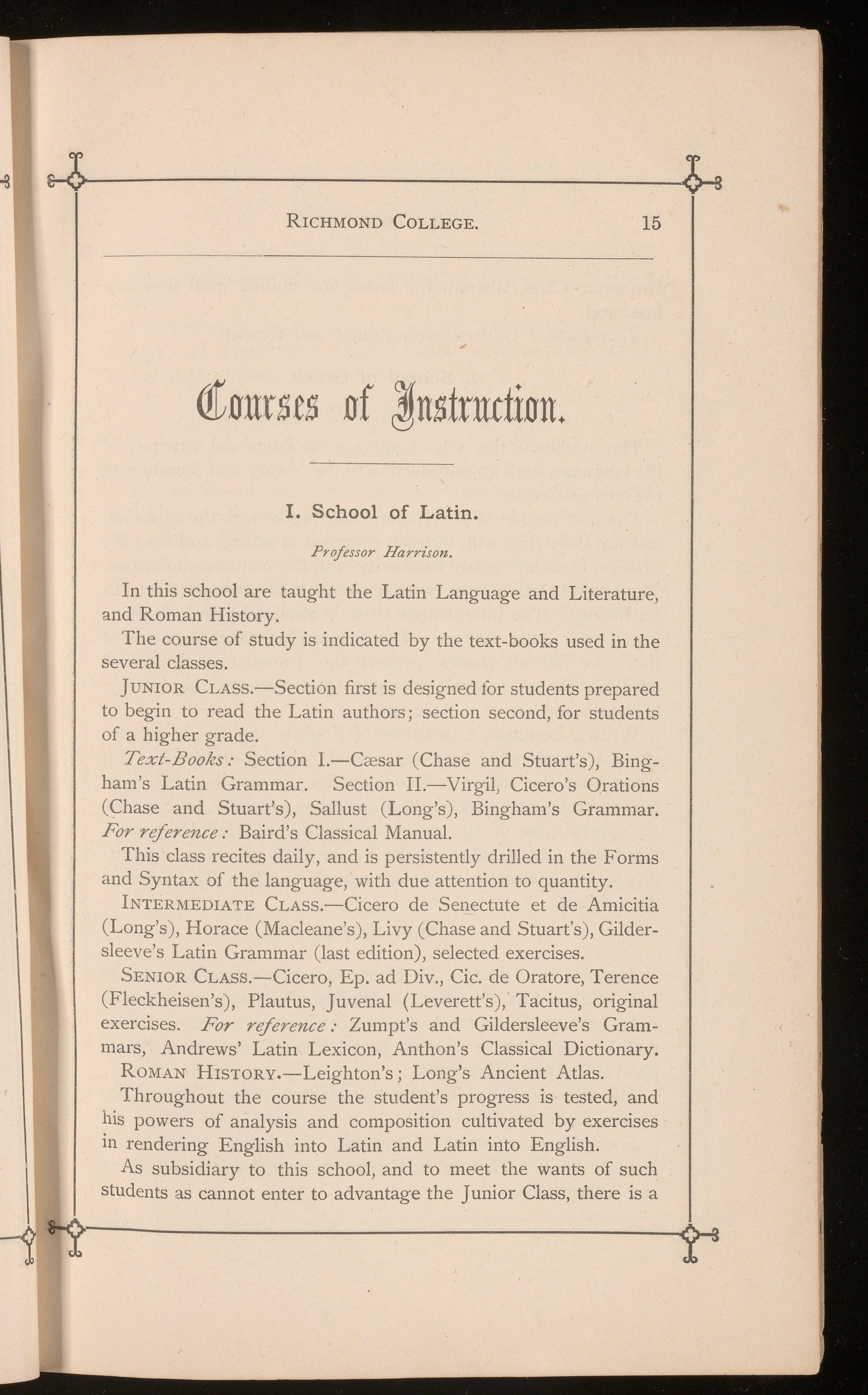
I. School of Latin.
Professor Harrison.
In this school are taught the Latin Language and Literature, and Roman History.
The course of study is indicated by the text-books used in the several classes.
JUNIOR CLAss.-Section first is designed for students prepared to begin to read the Latin authors; section second, for students of a higher grade.
Text-Books: Section I.-Cc e sar (Chase and Stuart's), Bingham's Latin Grammar. Section IL-Virgil , Cicero's Orations (Chase and Stuart's), Sallust ( Long's), Bingham's Grammar. For reference: Baird's Classical Manual.
This class recites daily, and is persistently drilled in the Forms and Syntax of the language, with due attention to quantity.
INTERMEDIATECLASs.-Cicero de Senectute et de Amicitia (Long's), Horace (Macleane's), Livy (Chase and Stuart's), Gildersleeve's Latin Grammar (last edition), selected exercises.
SENIOR CLASS.-Cicero, Ep. ad Div., Cic. de Oratore, Terence (Fleckheisen's ), Plautus, Juvenal (Leverett's ), Tacitus, original exercises. For reference: Zumpt's and Gildersleeve's Grammars, Andrews' Latin Lexicon, Anthon's Classical Dictionary.
ROMAN HrsToRv.-Leighton's; Long's Ancient Atlas.
Throughout the course the student's progress is tested, and his powers of analysis and composition cultivated by exercises in rendering English into Latin and Latin into English.
As subsidiary to this school, and to meet the wants of such students as cannot enter to advantage the Junior Class, there is a
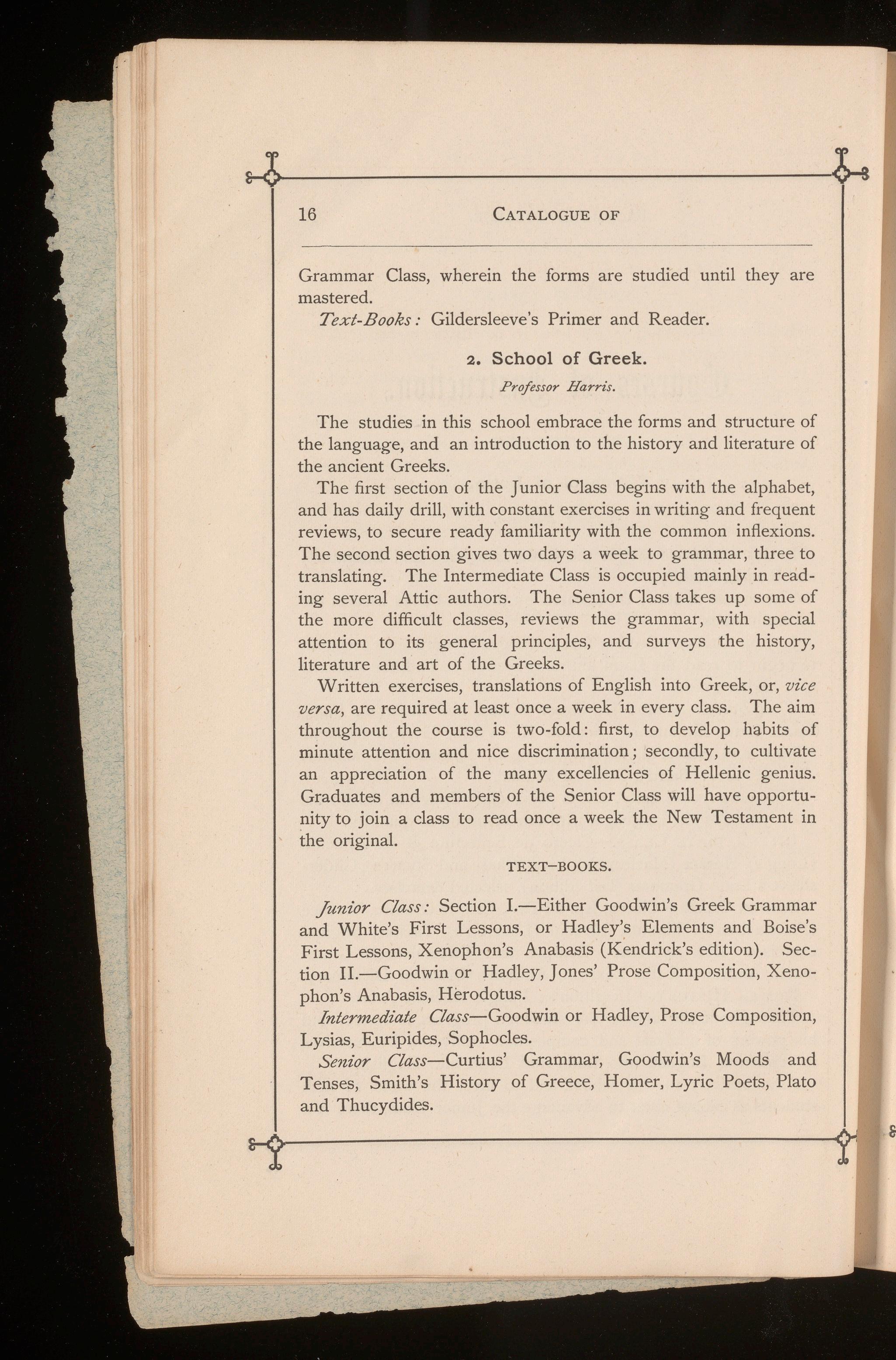
CATALOGUE OF
Grammar Class, wherein the forms are studied until they are mastered.
Text-Books: Gildersleeve's Primer and Reader.
2. School of Greek. Professor Harris.
The studies in this school embrace the forms and structure of the language, and an introduction to the history and literature of the ancient Greeks.
The first section of the Junior Class begins with the alphabet, and has daily drill, with constant exercises in writing and frequent reviews, to secure ready familiarity with the common inflexions. The second section gives two days a week to grammar, three to translating. The Intermediate Class is occupied mainly in reading several Attic authors. The Senior Class takes up some of the more difficult classes, reviews the grammar, with special attention to its general principles, and surveys the history, literature and art of the Greeks.
Written exercises, translations of English into Greek, or, vice versa, are required at least once a week in every class. The aim throughout the course is two-fold: first, to develop habits of minute attention and nice discrimination; secondly, to cultivate an appreciation of the many excellencies of Hellenic genius. Graduates and members of the Senior Class will have opportunity to join a class to read once a week the New Testament in the original.
TEXT-BOOKS.
Junior Class: Section !.-Either Goodwin's Greek Grammar and White's First Lessons, or Hadley's Elements and Boise's First Lessons, Xenophon's Anabasis (Kendrick's edition). Section IL-Goodwin or Hadley, Jones' Prose Composition, Xenophon's Anabasis, Herodotus.
Intermediate Class-Goodwin or Hadley, Prose Composition, Lysias, Euripides, Sophocles.
Senior Class-Curtius' Grammar, Goodwin's Moods and Tenses, Smith's History of Greece, Homer, Lyric Poets, Plato and Thucydides.
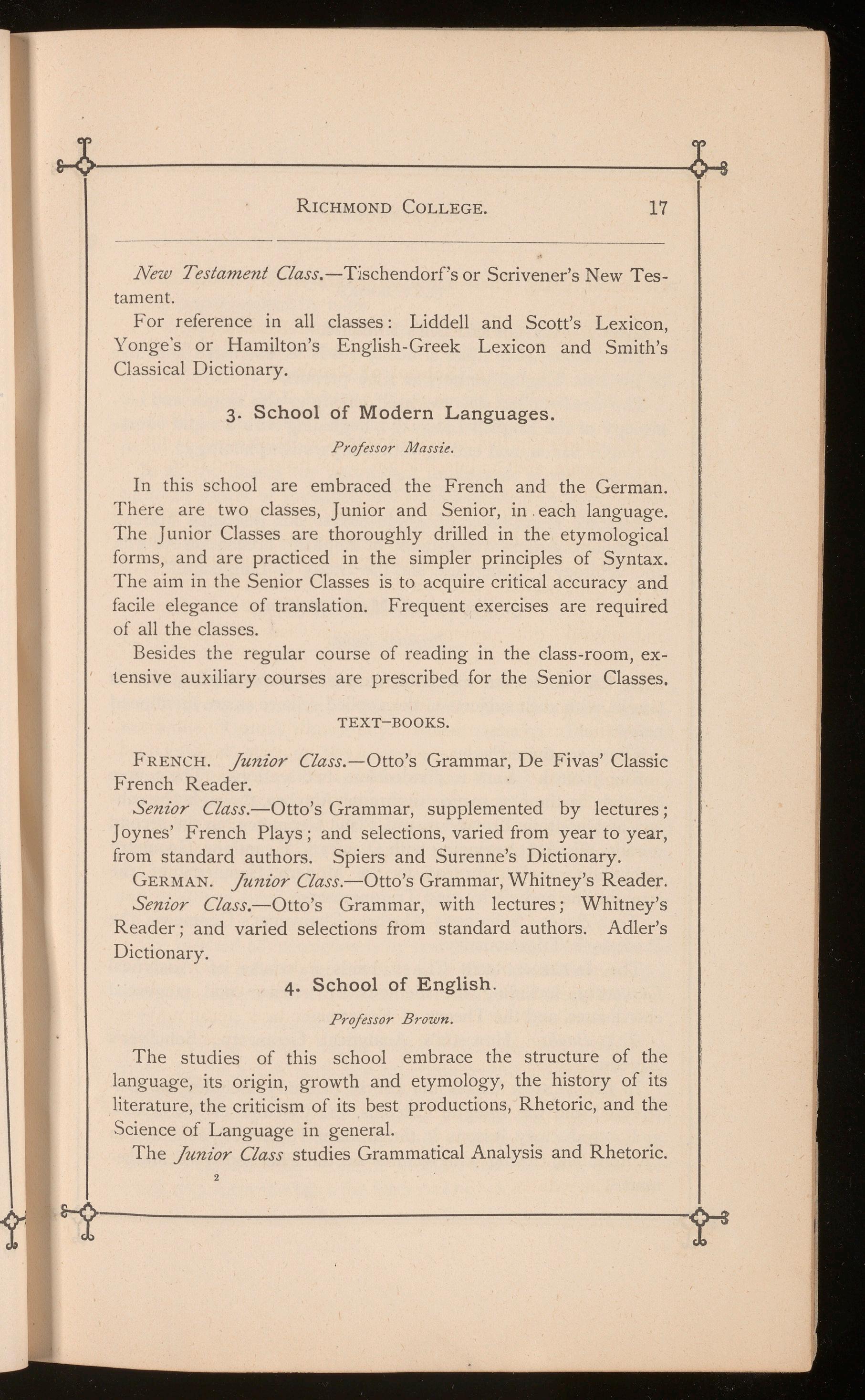
New Testament Class.-Tischendorf 's or Scrivener's New Testament.
For reference in all classes: Liddell and Scott's Lexicon, Yonge's or Hamilton's English-Greek Lexicon and Smith's Classical Dictionary.
Professor Massie.
In this school are embraced the French and the German. Th ere are two classes, Junior and Senior, in each language. The Junior Classes are thoroughly drilled in the etymological forms, and are practiced in the simpler principles of Syntax. The aim in the Senior Classes is to acquire critical accuracy and facile elegance of translation. Frequent exercises are required of all the classes.
Besides the regular course of reading in the class-room, extensive auxiliary courses are prescribed for the Senior Classes.
TEXT-BOOKS.
FRENCH Junior Class.-Otto's Grammar, De Fivas' Classic French Reader.
Senior Class.-Otto's Grammar, supplemented by lectures; Joynes' French Plays; and selections, varied from year to year, from standard authors . Spiers and Surenne's Dictionary.
GERMAN. Junior Class.-Otto's Grammar, Whitney's Reader.
Senior Class.-Otto's Grammar, with lectures; Whitney's Reader; and varied selections from standard authors. Adler's Dictionary.
Professor Bi-own.
The studies of this school embrace the structure of the language, its origin, growth and etymology, the history of its literature, the criticism of its best productions, Rhetoric, and the Science of Language in general.
The Junior Class studies Grammatical Analysis and Rhetoric.
CATALOGUEOF
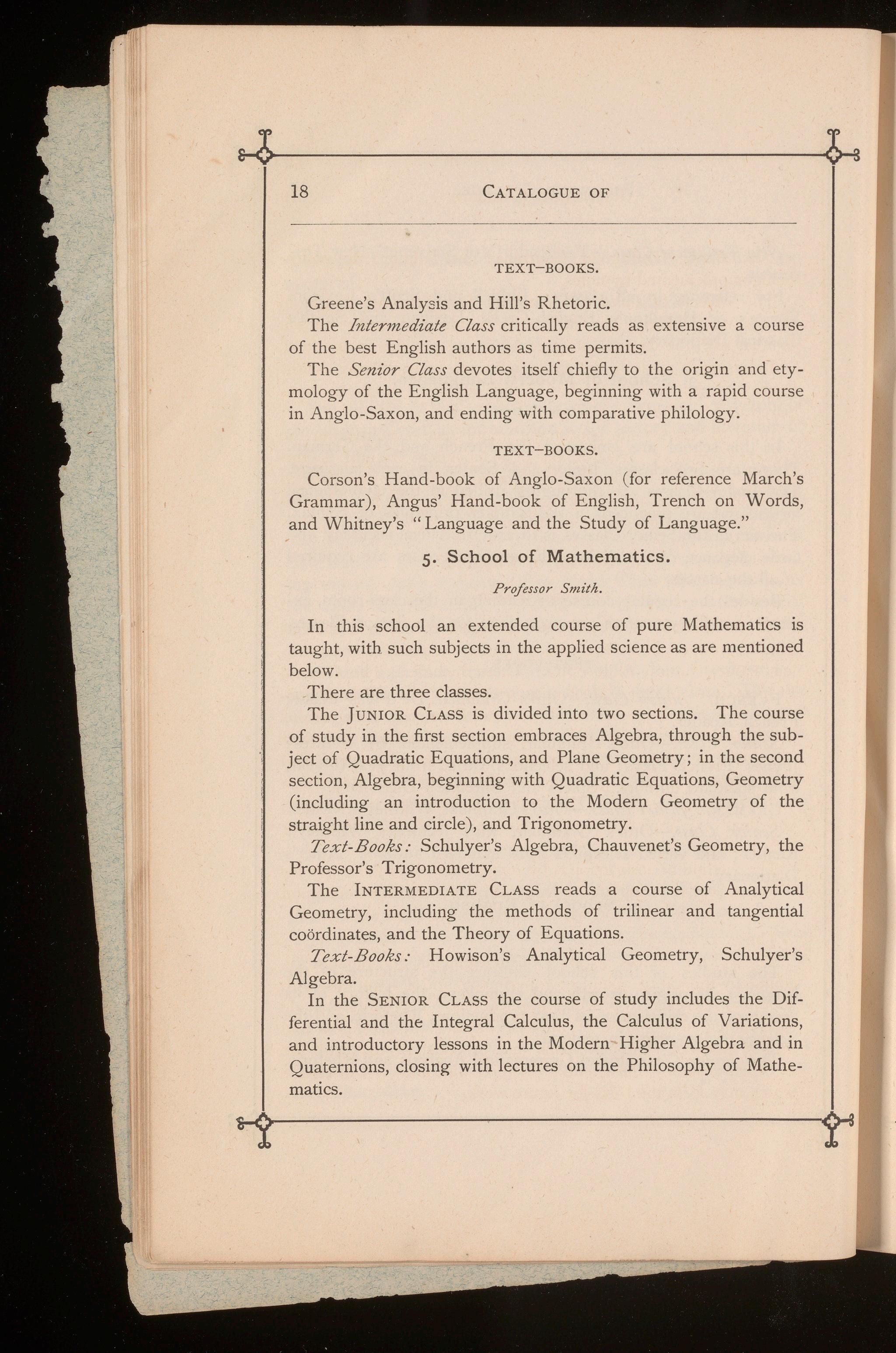
TEXT-BOOKS.
Greene's Analysis and Hill's Rhetoric.
The .Intermediate Class critically reads as extensive a course of the best English authors as time permits.
The Senior Class devotes itself chiefly to the origin and etymology of the English Language, beginning with a rapid course in Anglo-Saxon, and ending with comparative philology
TEXT-BOOKS.
Corson's Hand-book of Anglo-Saxon (for reference March's Grammar), Angus' Hand-book of English, Trench on Words, and Whitney's "Language and the Study of Language."
5. School of Mathematics.
Professor Smith.
In this school an extended course of pure Mathematics is taught, with such subjects in the applied science as are mentioned below.
There are three classes.
The JUNIOR CLASS is divided into two sections. The course of study in the first section embraces Algebra, through the subject of Quadratic Equations, and Plane Geometry; in the second section, Algebra, beginning with Quadratic Equations, Geometry (including an introduction to the Modern Geometry of the straight line and circle), and Trigonometry.
Text-Books: Schulyer's Algebra, Chauvenet's Geometry, the Professor's Trigonometry.
The INTERMEDIATE CLASS reads a course of Analytical Geometry, including the methods of trilinear and tangential coordinates, and the Theory of Equations.
Text-Books: Howison's Analytical Geometry, Schulyer's Algebra.
In the SENIOR CLASS the course of study includes the Differential and the Integral Calculus, the Calculus of Variations, and introductory lessons in the Modern Higher Algebra and in Quaternions, closing with lectures on the Philosophy of Mathematics.
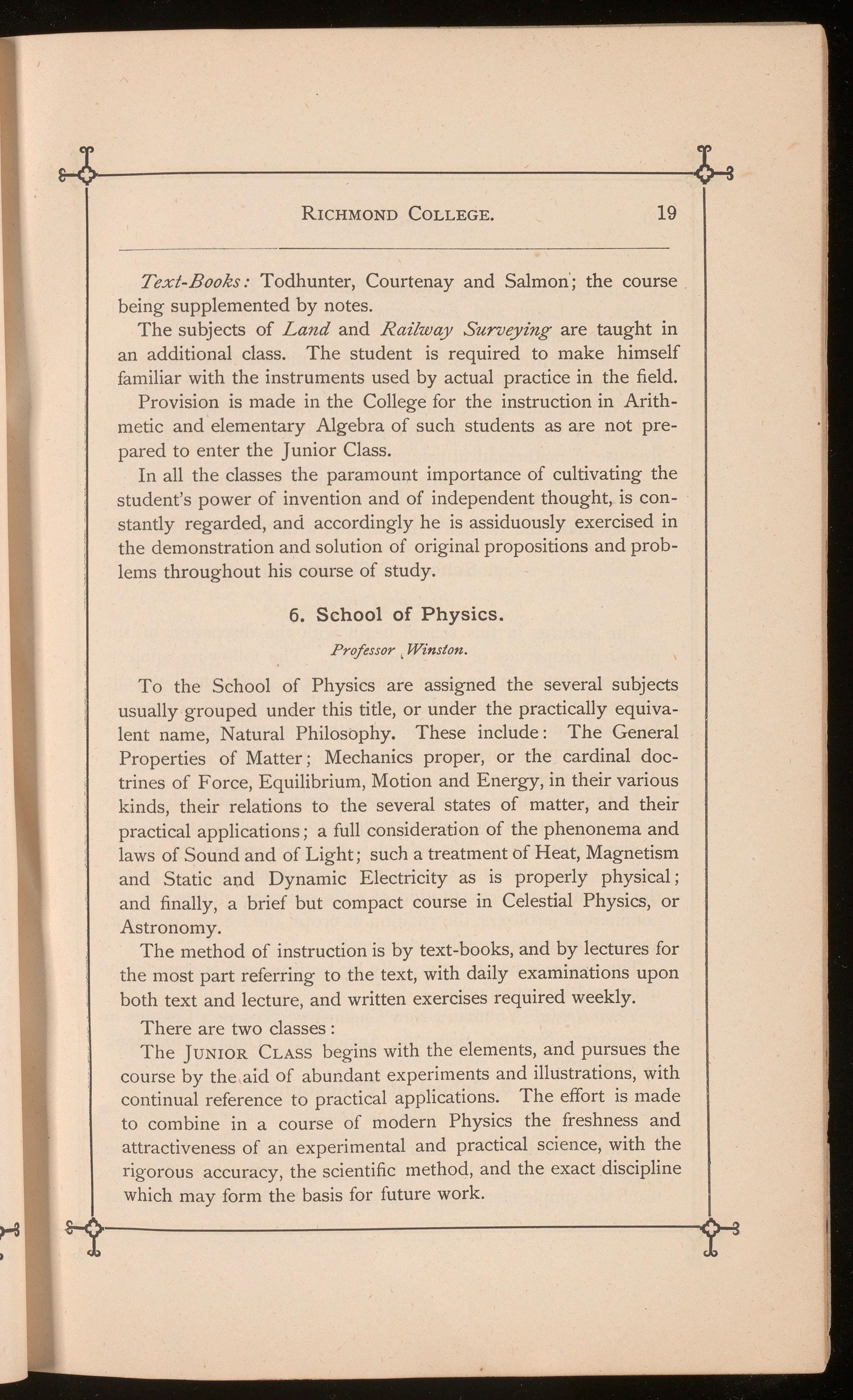
Text-Books: Todhunter, Courtenay and Salmon ; the course being supplemented by notes.
The subjects of Land and Railway Surveying are taught in an additional class. The student is required to make himself familiar with the instruments used by actual practice in the field.
Provision is made in the College for the instruction in Arithmetic and elementary Algebra of such students as are not prepared to enter the Junior Class.
In all the classes the paramount importance of cultivating the student's power of invention and of independent thought, is constantly regarded, and accordingly he is assiduously exercised in the demonstration and solution of original propositions and problems throughout his course of study.
Professor , Winston.
To the School of Physics are assigned the several subjects usually grouped under this title, or under the practically equivalent name, Natural Philosophy. These include: The General Properties of Matter; Mechanics proper, or the cardinal doctrines of Force, Equilibrium, Motion and Energy, in their various kinds, their relations to the several states of matter, and their practical applications; a full consideration of the phenonema and laws of Sound and of Light; such a treatment of Heat, Magnetism and Static and Dynamic Electricity as is properly physical; and finally, a brief but compact course in Celestial Physics, or Astronomy.
The method of instruction is by text-books, and by lectures for the most part referring to the text, with daily examinations upon both text and lecture, and written exercises required weekly.
There are two classes :
The JUNIOR CLASS begins with the elements, and pursues the course by the aid of abundant experiments and illustrations, with continual reference to practical applications. The effort is made to combine in a course of modern Physics the freshness and attractiveness of an experimental and practical science, with the rigorous accuracy, the scientific method, and the exact discipline which may form the basis for future work.
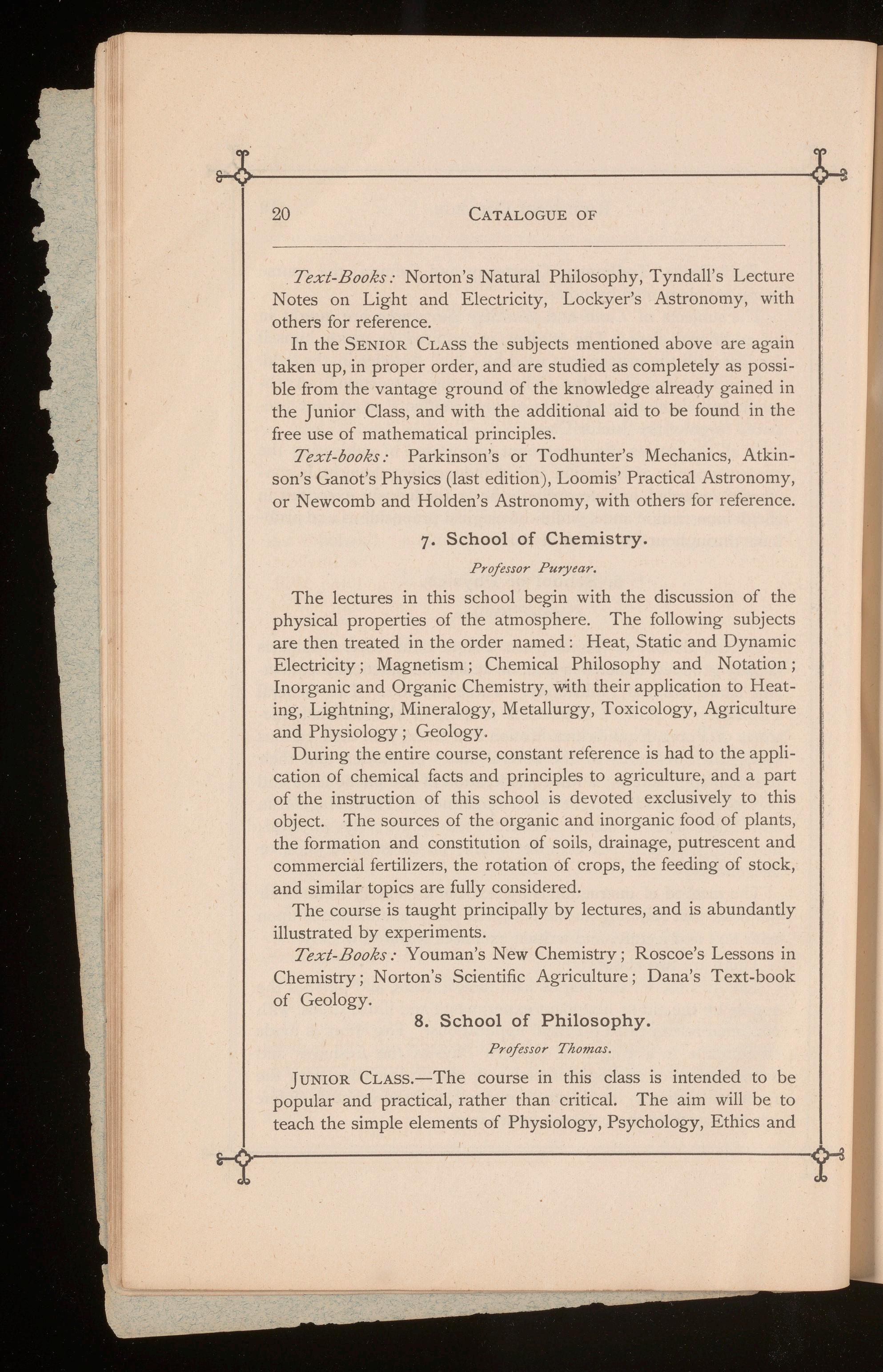
Text-Books: Norton's Natural Philosophy, Tyndall's Lecture Notes on Light and Electricity, Lockyer's Astronomy, with others for reference.
In the SENIOR CLASSthe subjects mentioned above are again taken up, in proper order, and are studied as completely as possible from the vantage ground of the knowledge already gained in the Junior Class, and with the additional aid to be found in the free use of mathematical principles.
Text-books: Parkinson's or Todhunter's Mechanics, Atkinson's Garrot's Physics (last edition ) , Loomis' Practica1 Astronomy, or Newcomb and Holden's Astronomy, with others for reference.
7. School of Chemistry.
Professor Puryear.
The lectures in this school begin with the discussion of the physical properties of the atmosphere The following subjects are then treated in the order named : Heat, Static and Dynamic Electricity; Magnetism; Chemical Philosophy and Notation; Inorganic and Organic Chemistry, with their application to Heating, Lightning, Mineralogy, Metallurgy, Toxicology, Agriculture and Physiology; Geology
During the entire course, constant reference is had to the application of chemical facts and principles to agriculture, and a part of the instruction of this school is devoted exclusively to this object . The sources of the organic and inorganic food of plants, the formation and constitution of soils, drainage, putrescent and commercial fertilizers, the rotation of crops, the feeding of stock, and similar topics are fully considered.
The course is taught principally by lectures, and is abundantly illustrated by experiments.
Text-Books: Youman's New Chemistry; Roscoe's Lessons in Chemistry; Norton's Scientific Agriculture; Dana's Text-book of Geology.
8. School of Philosophy.
Professor Thomas.
JUNIOR CLASS.-The course in this class is intended to be popular and practical, rather than critical. The aim will be to teach the simple elements of Physiology, Psychology, Ethics and
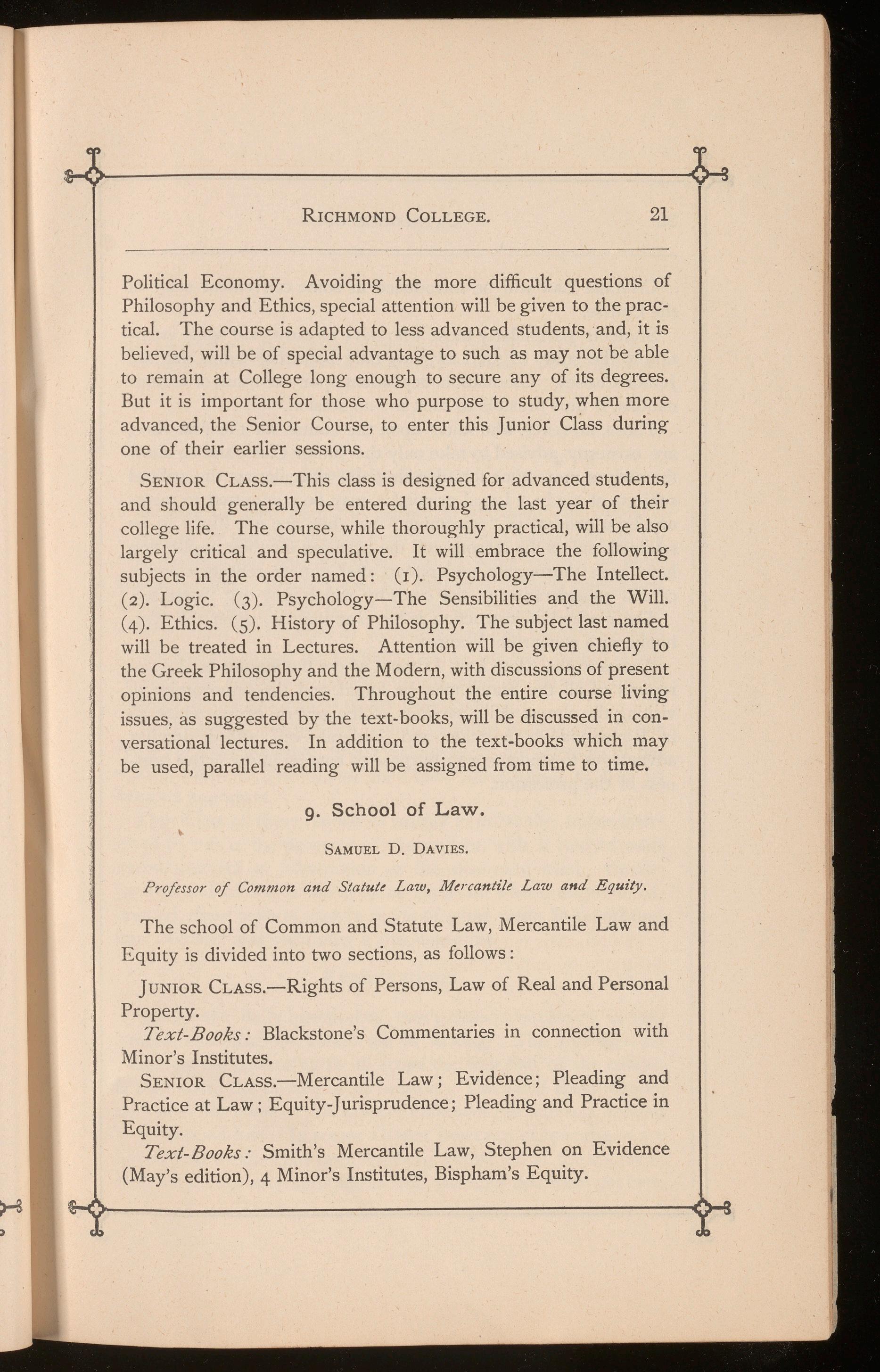
Political Economy. Avoiding the more difficult questions of Philosophy and Ethics, special attention will be given to the practical. The course is adapted to less advanced students, and, it is believed, will be of special advantage to such as may not be able to remain at College long enough to secure any of its degrees. But it is important for those who purpose to study, when more advanced, the Senior Course, to enter this Junior Class during one of their earlier sessions.
SENIOR CLASS.-This class is designed for advanced students, and should generally be entered during the last year of their college life. The course, while thoroughly practical, will be also largely critical and speculative. It will embrace the following subjects in the order named: (1). Psychology-The Intellect. (2). Logic. (3). Psychology-The Sensibilities and the Will. (4). Ethics. (5). History of Philosophy. The subject last named will be treated in Lectures. Attention will be given chiefly to the Greek Philosophy and the Modern, with discussions of present opinions and tendencies. Throughout the entire course living issues, as suggested by the text-books, will be discussed in conversational lectures. In addition to the text-books which may be used, parallel reading will be assigned from time to time.
SAMUEL D. DAVIES.
Professor of Common and Statute Law, Mercantile Law and Equity.
The school of Common and Statute Law, Mercantile Law and Equity is divided into two sections, as follows:
JUNIOR CLAss.-Rights of Persons, Law of Real and Personal Property.
Text-Books: Blackstone's Commentaries in connection with Minor's Institutes.
SENIOR CLAss.-Mercantile Law; Evidence; Pleading and Practice at Law; Equity-Jurisprudence; Pleading and Practice in Equity.
Text-Books: Smith's Mercantile Law, Stephen on Evidence (May's edition), 4 Minor's Institutes, Bispham's Equity.
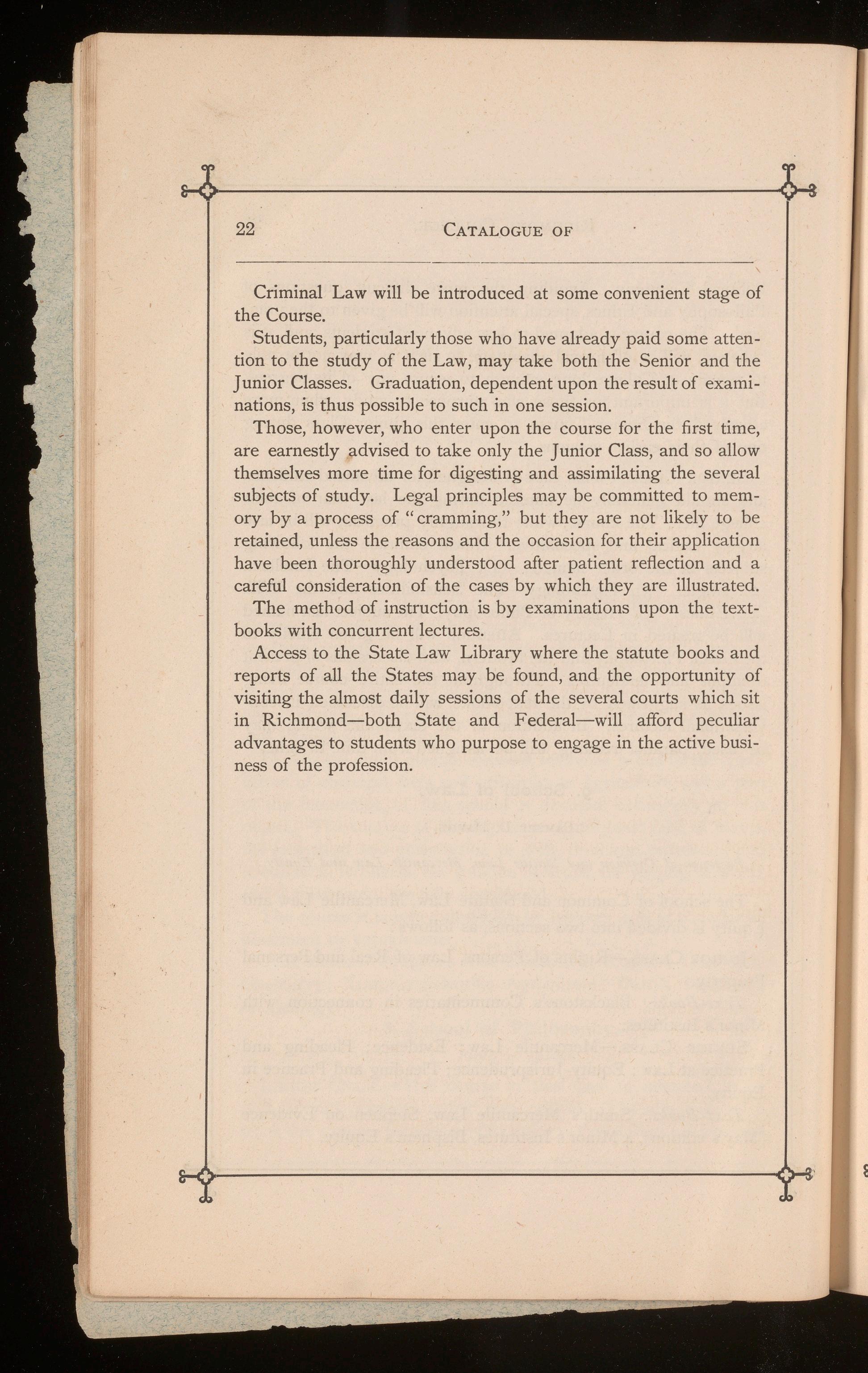
CATALOGUE OF
Criminal Law will be introduced at some convenient stage of the Course.
Students, particularly those who have already paid some attention to the study of the Law, may take both the Senior and the Junior Classes. Graduation, dependent upon the result of examinations, is thus possible to such in one session.
Those, however, who enter upon the course for the first time, are earnestly advised to take only the Junior Class, and so allow themselves more time for digesting and assimilating the several subjects of study. Legal principles may be committed to memory by a process of "cramming," but they are not likely to be retained, unless the reasons and the occasion for their application have been thoroughly understood after patient reflection and a careful consideration of the cases by which they are illustrated.
The method of instruction is by examinations upon the textbooks with concurrent lectures.
Access to the State Law Library where the statute books and reports of all the States may be found, and the opportunity of visiting the almost daily sessions of the several courts which sit in Richmond-both State and Federal-will afford peculiar advantages to students who purpose to engage in the active business of the profession.
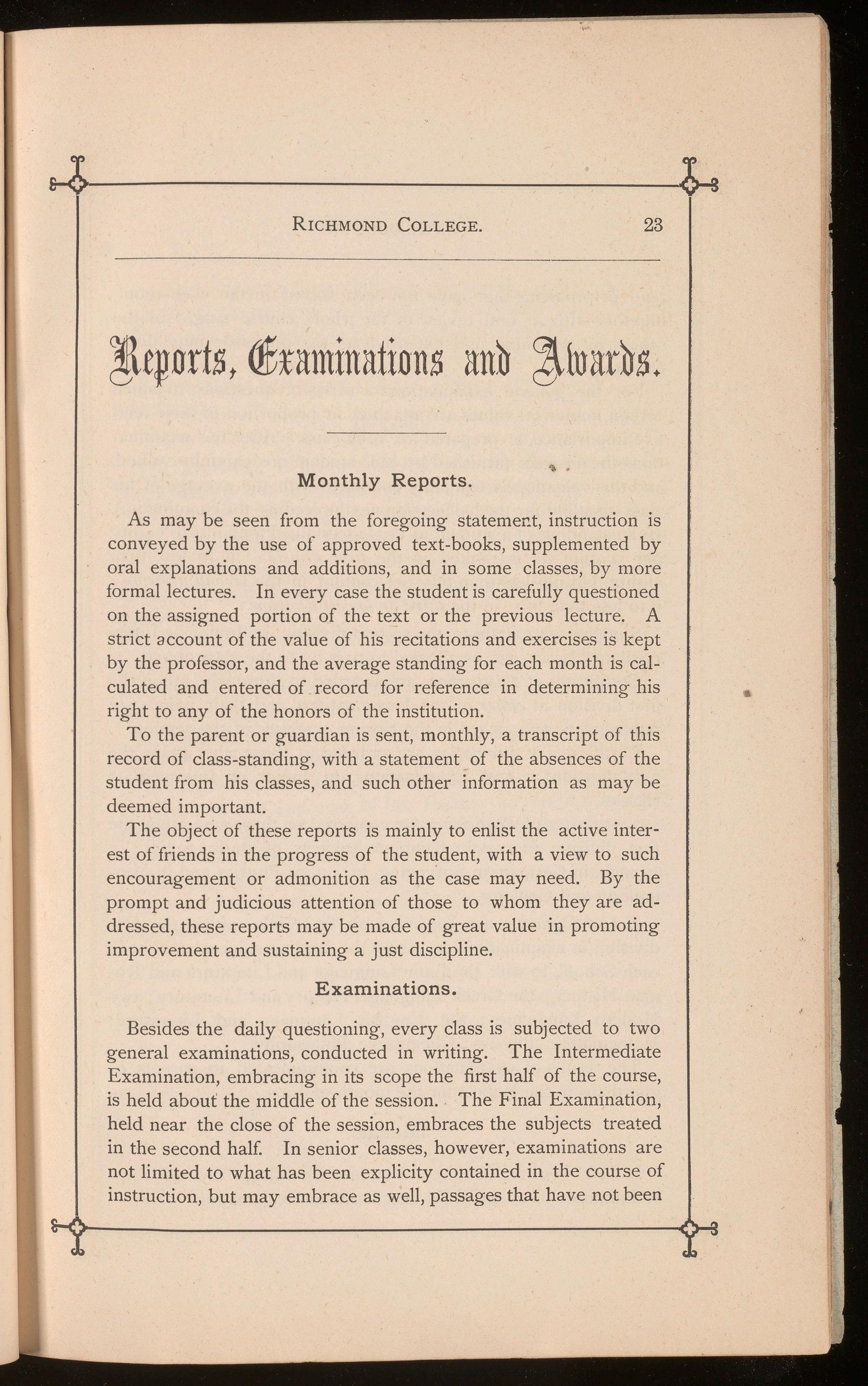
As may be seen from the foregoing statemer.t, instruction is conveyed by the use of approved text-books, supplemented by oral explanations and additions, and in some classes, by more formal lectures. In every case the student is carefully questioned on the assigned portion of the text or the previous lecture. A strict account of the value of his recitations and exercises is kept by the professor, and the average standing for each month is calculated and entered of record for reference in determining his right to any of the honors of the institution.
To the parent or guardian is sent, monthly, a transcript of this record of class-standing, with a statement of the absences of the student from his classes, and such other information as may be deemed important.
The object of these reports is mainly to enlist the active interest of friends in the progress of the student, with a view to such encouragement or admonition as the case may need. By the prompt and judicious attention of those to whom they are addressed, these reports may be made of great value in promoting improvement and sustaining a just discipline.
Besides the daily questioning, every class is subjected to two general examinations, conducted in writing. The Intermediate Examination, embracing in its scope the first half of the course, is held about the middle of the session. The Final Examination, held near the close of the session, embraces the subjects treated in the second half. In senior classes, however, examinations are not limited to what has been explicity contained in the course of instruction, but may embrace as well, passages that have not been
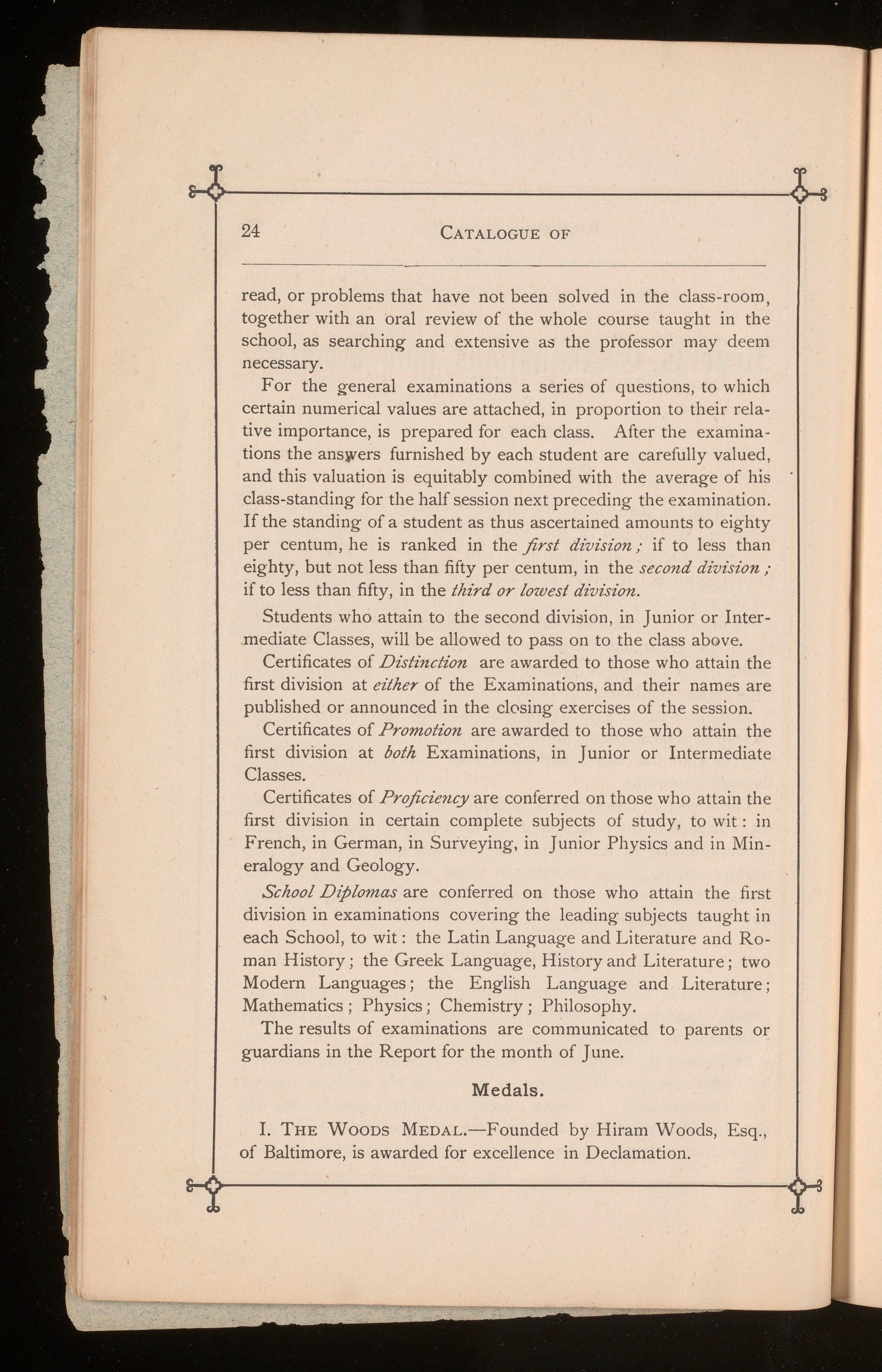
read, or problems that have not been solved in the class-room, together with an oral review of the whole course taught in the school, as searching and extensive as the professor may deem necessary.
For the general examinations a series of questions, to which certain numerical values are attached, in proportion to their relative importance, is prepared for each class. After the examinations the ansFers furnished by each student are carefully valued, and this valuation is equitably combined with the average of his class-standing for the half session next preceding the examination. If the standing of a student as thus ascertained amounts to eighty per centum, he is ranked in the first division; if to less than eighty, but not less than fifty per centum, in the second division; if to less than fifty, in the third or lowest division.
Students who attain to the second division, in Junior or Intermediate Classes, will be allowed to pass on to the class above.
Certificates of Distinction are awarded to those who attain the first division at either of the Examinations, and their names are published or announced in the closing exercises of the session.
Certificates of Promotion are awarded to those who attain the first division at both Examinations, in Junior or Intermediate Classes.
Certificates of Proficiency are conferred on those who attain the first division in certain complete subjects of study, to wit : in French, in German, in Surveying, in Junior Physics and in Mineralogy and Geology.
School Diplomas are conferred on those who attain the first division in examinations covering the leading subjects taught in each School, to wit: the Latin Language and Literature and Roman History; the Greek Language, History and Literature; two Modern Languages; the English Language and Literature; Mathematics ; Physics; Chemistry; Philosophy.
The results of examinations are communicated to parents or guardians in the Report for the month of June.
Medals.
I. THE Wooos MEDAL.-Founded by Hiram Woods, Esq., of Baltimore, is awarded for excellence in Declamation.
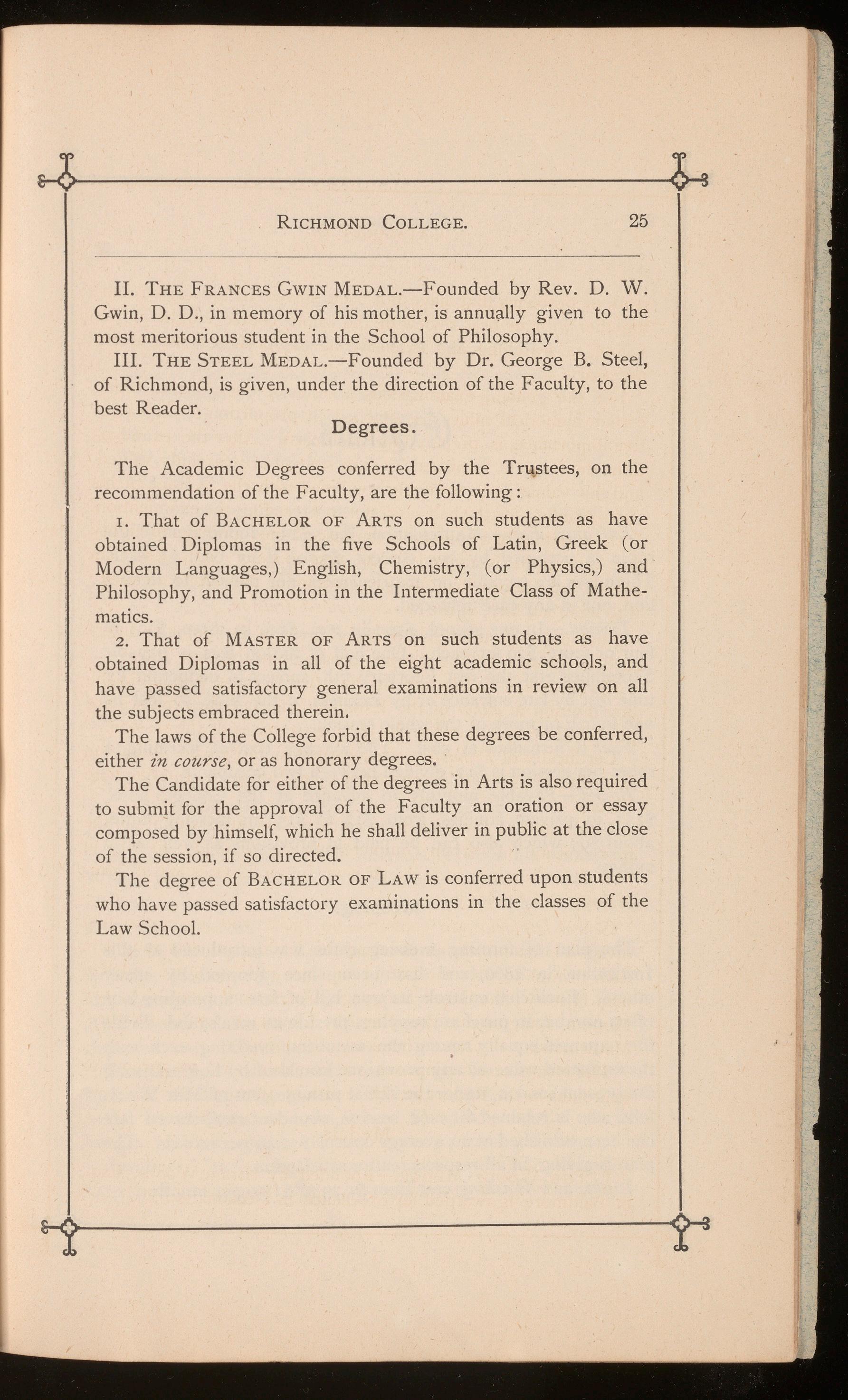
II. THE FRANCESGWIN MEDAL-Founded by Rev. D. W. Gwin, D. D., in memory of his mother, is annually given to the most meritorious student in the School of Philosophy.
III. THE STEEL MEDAL.-Founded by Dr. George B. Steel, of Richmond, is given, under the direction of the Faculty, to the best Reader.
Degrees.
The Academic Degrees conferred by the Tr~stees, on the recommendation of the Faculty, are the following:
I. That of BACHELOR OF ARTS on such students as have obtained Diplomas in the five Schools of Latin, Greek ( or Modern Languages,) English, Chemistry, (or Physics,) and Philosophy, and Promotion in the Intermediate Class of Mathematics.
2. That of MASTER OF ARTS on such students as have obtained Diplomas in all of the eight academic schools, and have passed satisfactory general examinations in review on all the subjects embraced therein.
The laws of the College forbid that these degrees be conferred, either in course, or as honorary degrees.
The Candidate for either of the degrees in Arts is also required to submit for the approval of the Faculty an oration or essay composed by himself, which he shall deliver in public at the close of the session, if so directed.
The degree of BACHELOROF LAW is conferred upon students who have passed satisfactory examinations in the classes of the Law School.
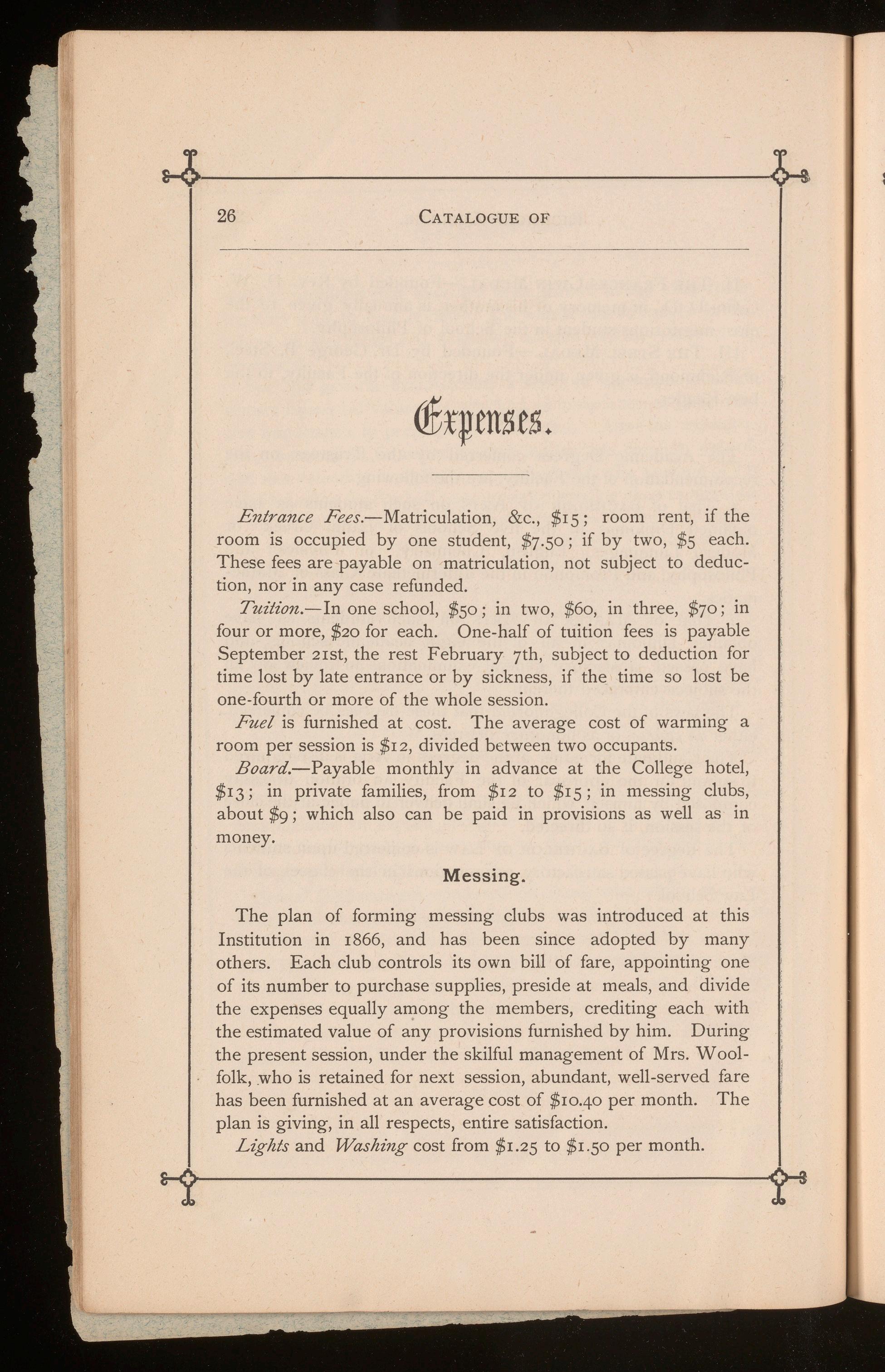
Entrance Fees.-Matriculation, &c., $rs; room rent, if the room is occupied by one student, $7.50; if by two, $5 each. These fees are payable on matriculation, not subject to deduction, nor in any case refunded.
Tuition.-In one school, $50; in two, $60, in three, $70; in four or more, $20 for each. One-half of tuition fees is payable September 21st, the rest February 7th, subject to deduction for time lo:st by late entrance or by sickness, if the time so lost be one-fourth or more of the whole session.
Fuel is furnished at cost. The average cost of warming a room per session is $r2, divided between two occupants.
Board.-Payable monthly in advance at the College hotel, $r3; in private families, from $r2 to $rs; in messing clubs, about $9; which also can be paid in provisions as well as m money.
Messing.
The plan of forming messing clubs was introduced at this Institution in r866, and has been since adopted by many others. Each club controls its own bill of fare, appointing one of its number to purchase supplies, preside at meals, and divide the expenses equally among the members, crediting each with the estimated value of any provisions furnished by him. During the present session, under the skilful management of Mrs. Woolfolk, who is retained for next session, abundant, well-served fare has been furnished at an average cost of $ro-40 per month. The plan is giving, in all respects, entire satisfaction.
Lights and Washing cost from $1.25 to $r.50 per month.
Summary.
I. FOR A STVDENT RESIDENT AT THE COLLEGE.
Entrance Fees (embracing matriculation, room rent, use of public rooms, and servants' attendance), - $20 oo
Tuition in three schools (the usual number), - 70 oo
Board in messing clubs, about ·
oo Fuel, lights, and washing, about
uo Mess hall fee,
Total expenses for entire session, (Tuition in the School of Law, $80.)
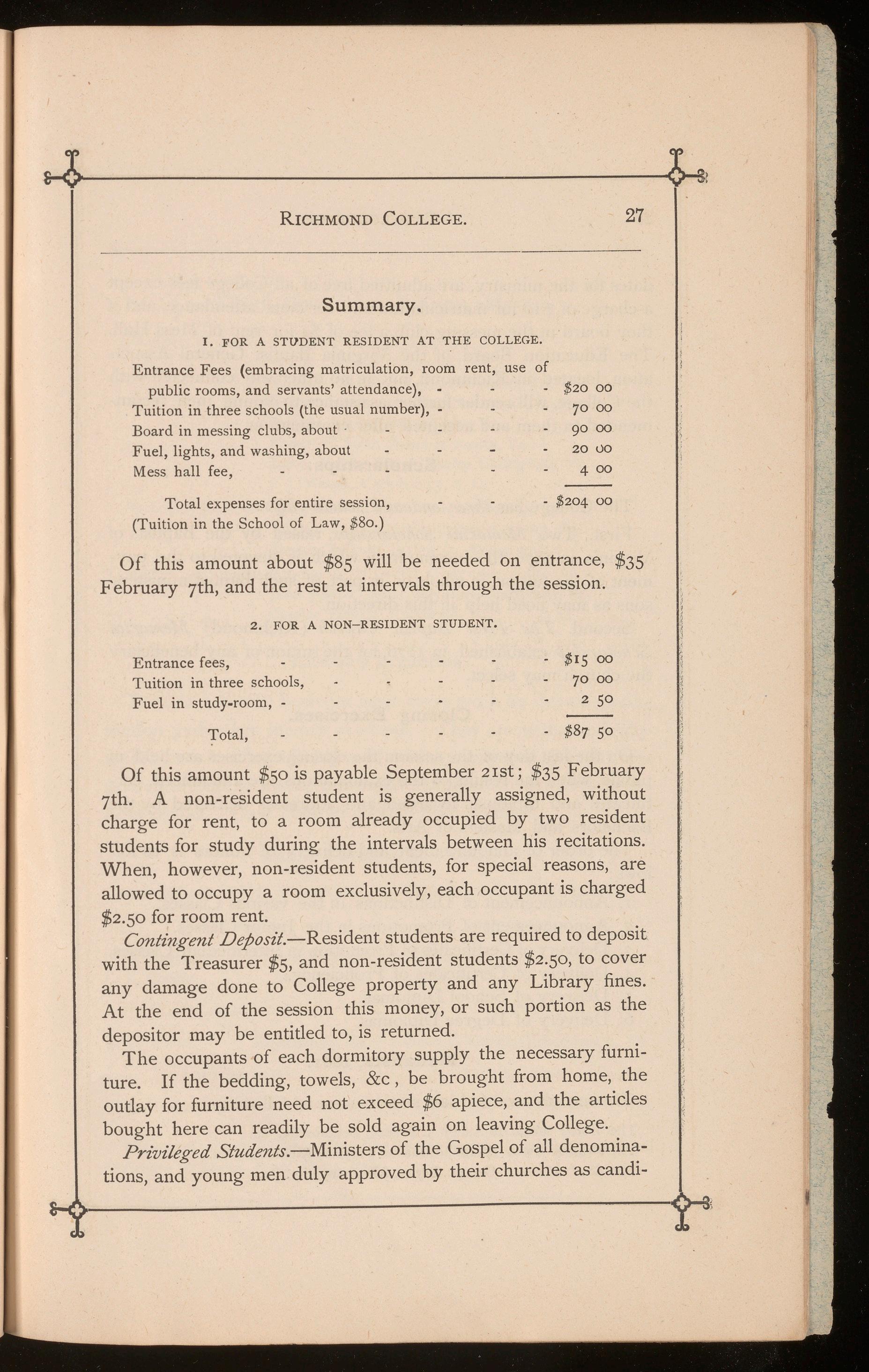
$204 00
Of this amount about $85 will be needed on entrance, $35 February 7th, and the rest at intervals through the sess10n.
2. FOR A NON-RESIDENT STUDENT.
Entrance fees, Tuition in three schools, Fuel in study-room,Total, $15 00 70 00 2 50
Of this amount $50 is payable September 21st; $35 February 7th. A non-resident student is generally assigned, without charge for rent, to a room already occupied by two resident students for study during the intervals between his recitations. When, however, non-resident students, for special reasons, are allowed to occupy a room exclusively, each occupant is charged $2.50 for room rent.
Contingent Deposit.-Resident students are required to deposit with the Treasurer $5, and non-resident students $2.50, to cover any damage done to College property and any Library fines. At the end of the session this money, or such portion as the depositor may be entitled to, is returned.
The occupants of each dormitory supply the necessary furniture. If the bedding, towels, &c , be brought from home, the outlay for furniture need not exceed $6 apiece, and the articles bought here can readily be sold again on leaving College.
Privileged Students.-Ministers of the Gospel of all denominations, and young men duly approved by their churches as candi-
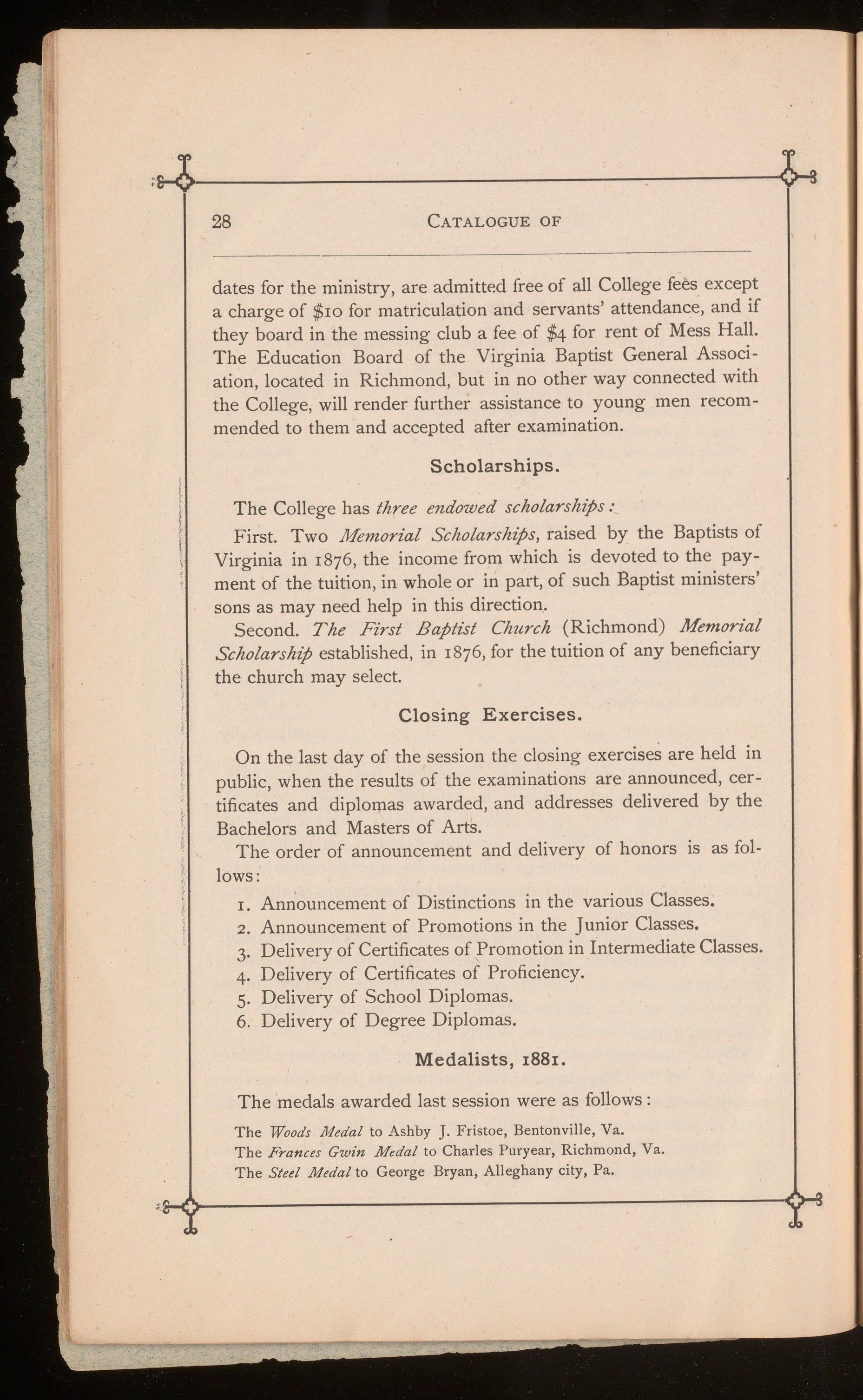
CATALOGUE OF
dates for the ministry, are admitted free of all College fees except a charge of $10 for matriculation and servants' attendance, and if they board in the messing club a fee of $4 for rent of Mess Hall. The Education Board of the Virginia Baptist General Association, located in Richmond, but in no other way connected with the College, will render further assistance to young men recommended to them and accepted after examination.
The College has three endowed scholarships:
First. Two Memorial Scliolarships, raised by the Baptists of Virginia in 1876, the income from which is devoted to the payment of the tuition, in whole or in part, of such Baptist ministers' sons as may need help in this direction.
Second. The First Baptist Church (Richmond) Memorial Scholarship established, in 1876, for the tuition of any beneficiary the church may select.
On the last day of the session the closing exercises are held in public, when the results of the examinations are announced, certificates and diplomas awarded, and addresses delivered by the Bachelors and Masters of Arts.
The order of announcement and delivery of honors is as follows:
1. Announcement of Distinctions in the various Classes.
2. Announcement of Promotions in the Junior Classes.
3. Delivery of Certificates of Promotion in Intermediate Classes.
4- Delivery of Certificates of Proficiency.
5. Delivery of School Diplomas.
6. Delivery of Degree Diplomas.
1881.
The medals awarded last session were as follows :
The Woods Medal to Ashby J. Fristoe, Bentonville, Va.
The Frances Gwin Medal to Charles Puryear, Richmond, Va.
The Steel Medal to George Bryan, Alleghany city, Pa.
RICHMOND COLLEGE.
Titled Graduates, Session 1880-81.
Bachelors of Law.-George Bryan, Alleghany city, Penn.
Walter Christian, Richmond, Va
William Wirt Henry, Jr., Richmond, Va
Edward Everett Holland, Nansemond county, Va.
John H. Ingram, Manchester, Va.
Robert E. Scott, Fauquier county, Va.
James Benton Seward, Surry Courthouse, Va.
J J. Waters, York county, S. C.
Bachelors of Arts.-James Ludwell Lake, Fauquier county, Va.
Edward Fillison Settle, Culpeper county, Va.
George Braxton Taylor, Jr., Rome, Italy.
Master s of Arts -Landon Carter Catlett, Gloucester county, Va.
John Joseph Gunter, Accomac Courthouse, Va.
Charles Puryear, Richmond, Va.
The two Literary Societies meet every week for debate, declamation and other literary exercises. They are enthusiastically maintained, and, by offering medals for eminent ability and improvement, excite a generous emulation, productive of very beneficial results. Their libraries contain 2,000 volumes.
Final Celebration, 1881.
MU SIGMA RHO SOCIETY. PHILOLOGIAN SOCIETY. MEDALISTS.
G. B. Taylor, Jr., C L. Corbitt, ORATOR.
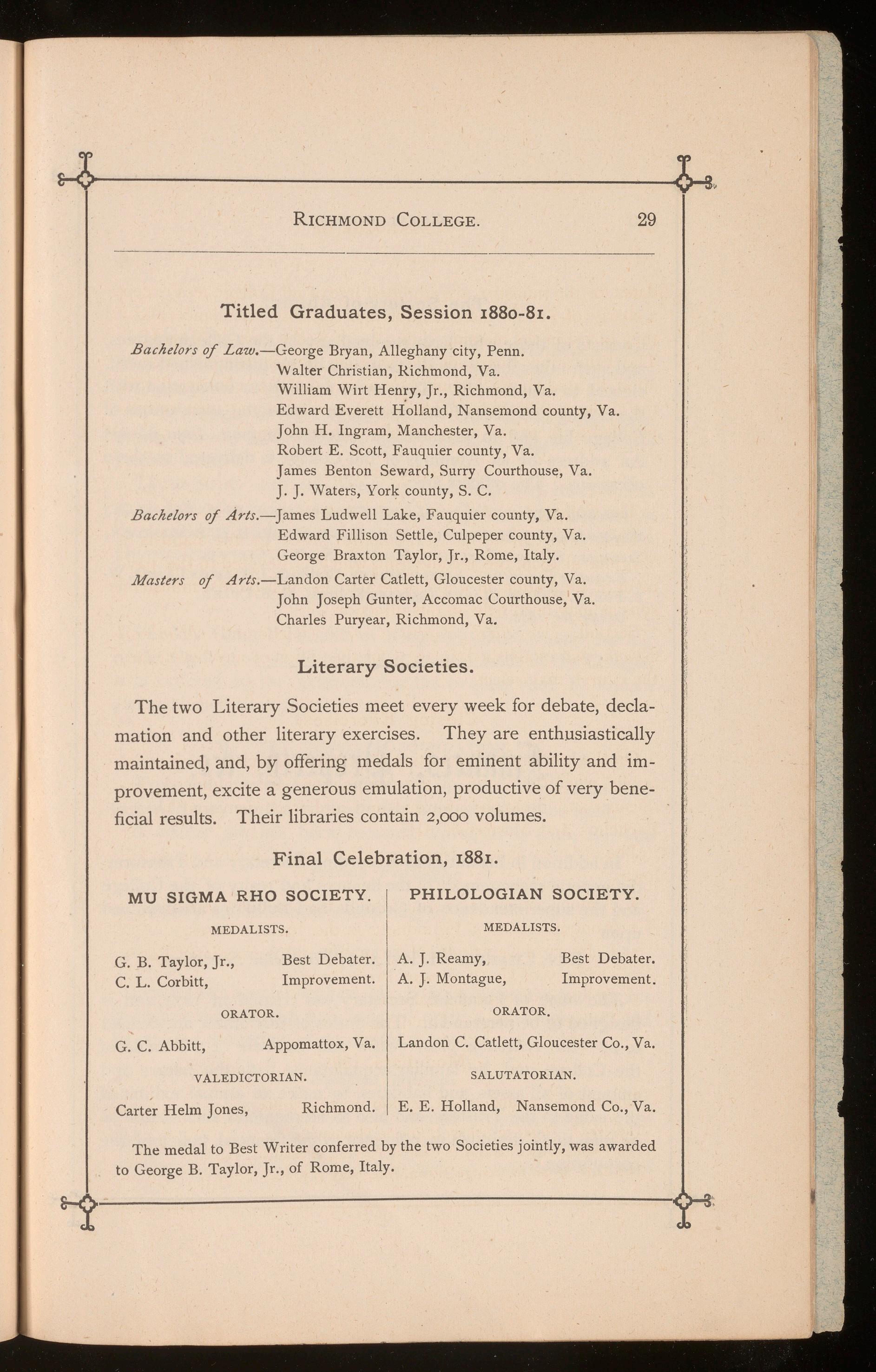
MEDALISTS
Best Debater. A. J Reamy, Improvement. A. J . Montague, ORATOR.
Best Debater. Improvement.
G. C . Abbitt, Appomattox, Va. Landon C. Catlett, Gloucester Co., Va.
VALEDICTORIAN.
SALUTATORIAN. Carter Helm Jones, Richmond . E. E. Holland, Nansemond Co., Va.
The medal to Best Writer conferred by the two Societies jointly, was awarded to George B. Taylor, Jr., of Rome, Italy.
Consists of those who have received any of the College degrees, and such other former students as may be, for distinguished merit, elected to membership. They meet annually in connection with the closing exercises of the session, to renew the associations of College life, and to promote the interests of their Alma Mater. An address by an Alumnus of the College is delivered on these occasions. The officers are :
President: HOWARD R. BAYNE; First Vice-President: R. B. LEE; Second Vice-President: J. H. NEWBILL; Third Vice-President: E. H. BARTENSTEIN; Treasurer: SOLOMONCUTCHINS; Secretary: SAM'L C. CLOPTON. Executive Committee.-ASHTON STARKE, Chairman, J. ALLSTON CABELL,W• F. Fox, G. HARVEY CLARKE, CHARLES E. JONES, M. B. CURRY. Orator for I882.-
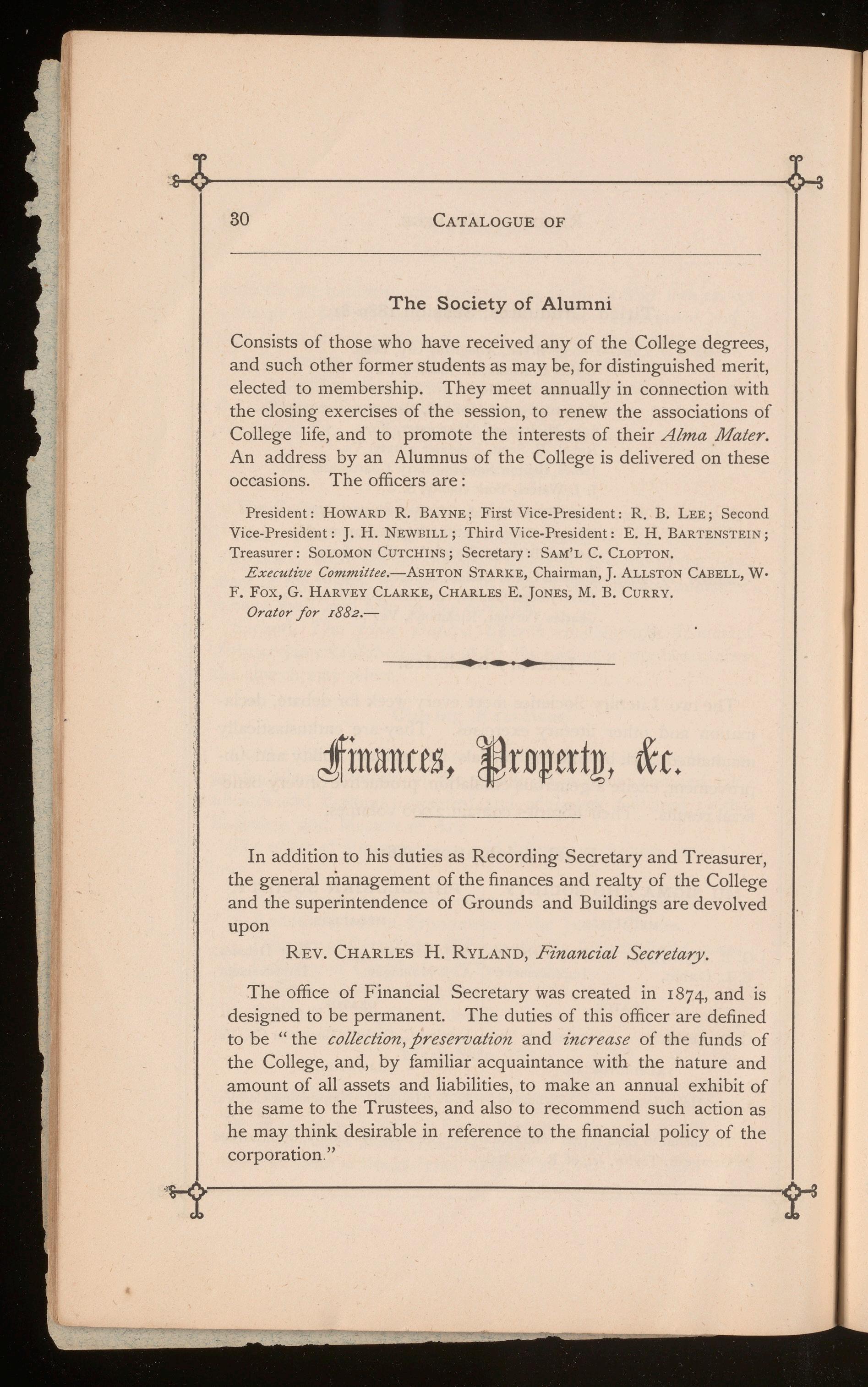
In addition to his duties as Recording Secretary and Treasurer, the general management of the finances and realty of the College and the superintendence of Grounds and Buildings are devolved upon
REV. CHARLES H. RYLAND, Financial Secretary.
The office of Financial Secretary was created in 1874, and is designed to be permanent. The duties of this officer are defined to be " the collection, preservation and increase of the funds of the College, and, by familiar acquaintance with the nature and amount of all assets and liabilities, to make an annual exhibit of the same to the Trustees, and also to recommend such action as he may think desirable in reference to the financial policy of the corporation."
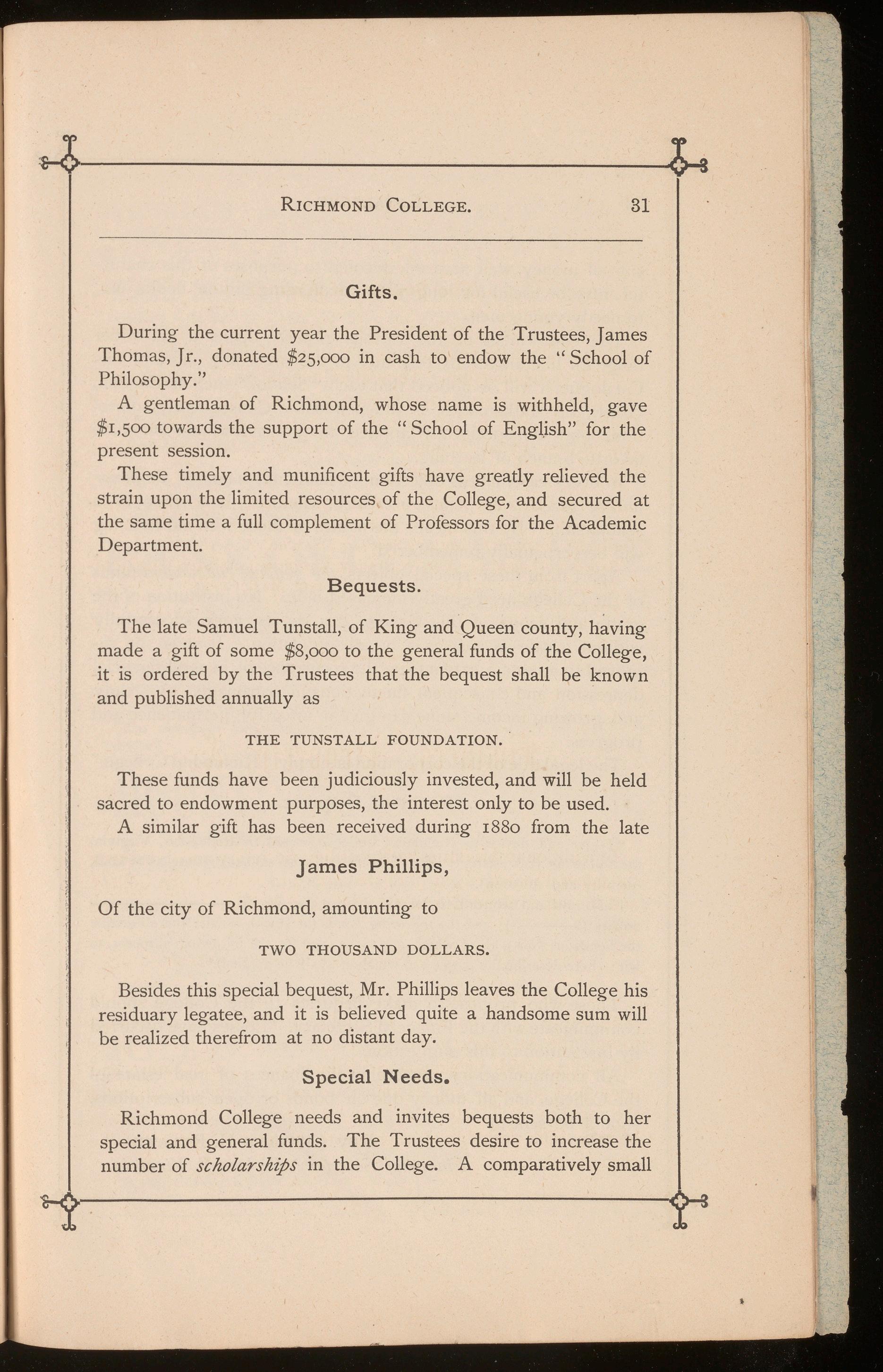
During the current year the President of the Trustees, James Thomas, Jr., donated $25,000 in cash to endow the "School of Philosophy ''
A gentleman of Richmond, whose name is withheld, gave $1,500 towards the support of the "School of Engl .ish" for the present session.
These timely and munificent gifts have greatly relieved the strain upon the limited resources of the College, and secured at the same time a full complement of Professors for the Academic Department.
The late Samuel Tunstall, of King and Queen county, having made a gift of some $8,000to the general funds of the College, it is ordered by the Trustees that the bequest shall be known and published annually as
THE TUNSTALL FOUNDATION .
These funds have been judiciously invested, and will be held sacred to endowment purposes, the interest only to be used. A similar gift has been received during 1880 from the late James Phillips,
Of the city of Richmond, amounting to TWO THOUSAND DOLLARS.
Besides this special bequest, Mr. Phillips leaves the College his residuary legatee, and it is believed quite a handsome sum will be realized therefrom at no distant day.
Richmond College needs and invites bequests both to her special and general funds. The Trustees desire to increase the number of scholarships in the College. A comparatively small
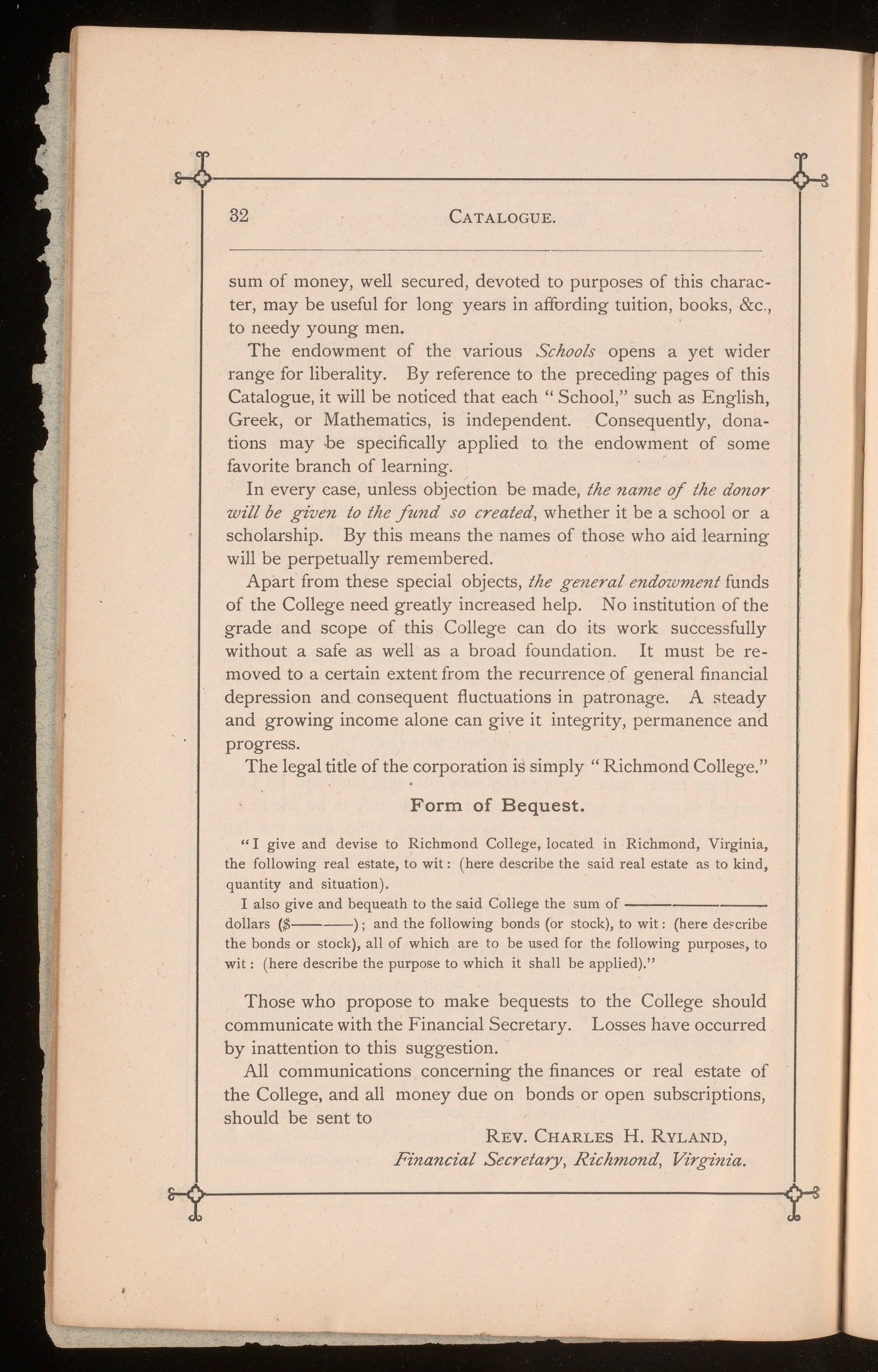
sum of money, well secured, devoted to purposes of this character, may be useful for long years in affording tuition, books, &c., to needy young men.
The endowment of the various Sclwols opens a yet wider range for liberality. By reference to the preceding pages of this Catalogue, it will be noticed that each "School," such as English, Greek, or Mathematics, is independent. Consequently, donations may be specifically applied to, the endowment of some favorite branch of learning.
In every case, unless objection be made, the name o.f the donor will be given to the .fund so created, whether it be a school or a scholarship. By this means the names of those who aid learning will be perpetually remembered.
Apart from these special objects, the general endowment funds of the College need greatly increased help. No institution of the grade and scope of this College can do its work successfully without a safe as well as a broad foundation. It must be removed to a certain extent from the recurrence .of general financial depression and consequent fluctuations in patronage. A ~teady and growing income alone can give it integrity, permanence and progress.
The legal title of the corporation is simply "Richmond College."
"I give and devise to Richmond College, located in Richmond, Virginia, the following real estate, to wit: (here describe the said real estate as to kind, quantity and situation).
I also give and bequeath to the said College the sum of ----dollars ($----); and the following bonds (or stock), to wit: (here de~cribe the bonds or stock), all of which are to be used for the following purposes, to wit: (here describe the purpose to which it shall be applied)."
Those who propose to make bequests to the College should communicate with the Financial Secretary. Losses have occurred by inattention to this suggestion.
All communications concerning the finances or real estate of the College, and all money due on bonds or open subscriptions, should be sent to
REV. CHARLES H. RYLAND, Financial Secretary, Richmond, Virginia.
)--------6-s
BOOKS AND STATIONERY.
DEALERS IN
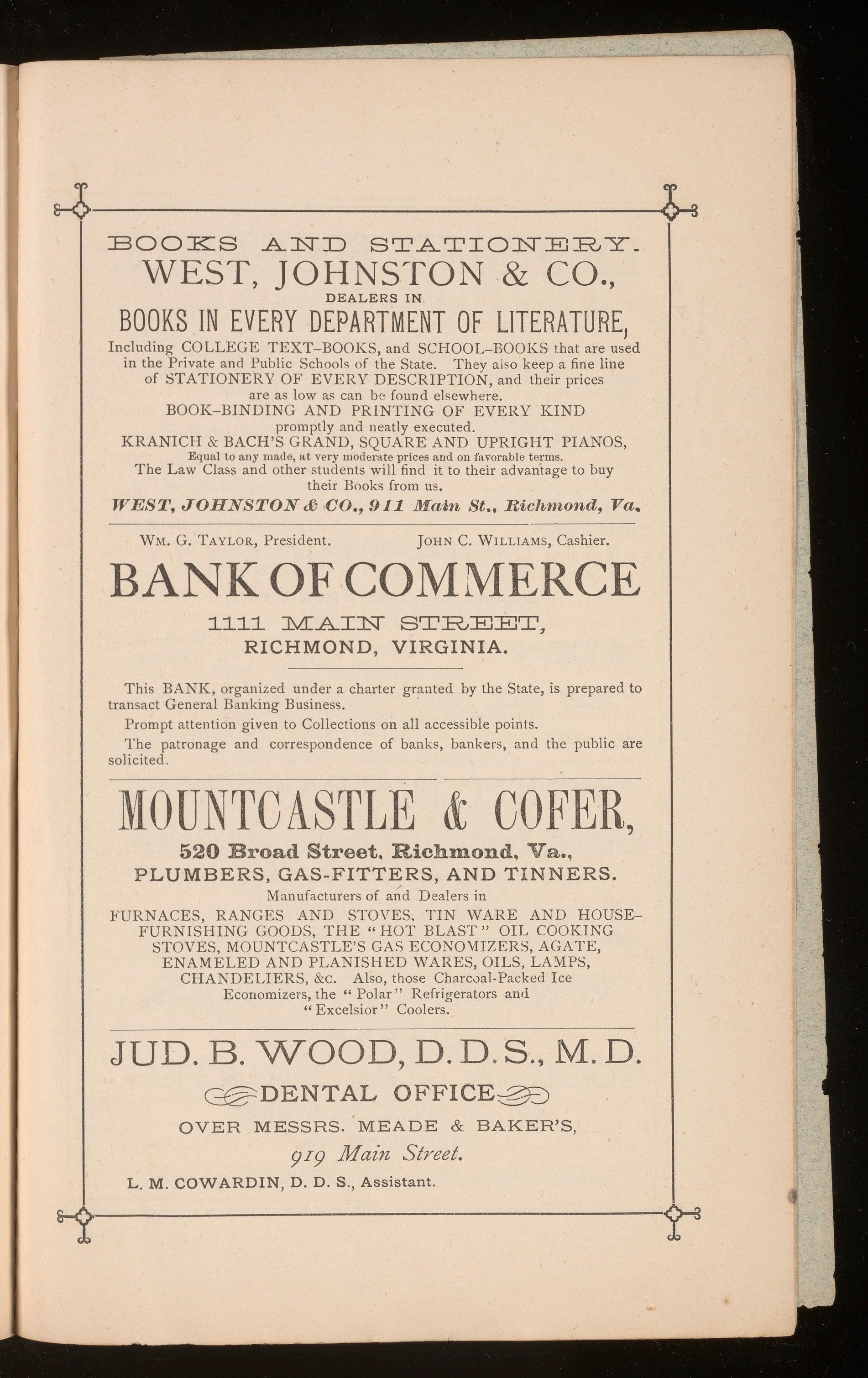
CO.,
BOOKSINEVERYDEPARTMENTOFLITERATURE,
Including COLLEGE TEXT-BOOKS, and SCHOOL-BOOKS that are used in the Private and Public Schools of the State. They also keep a fine line of STATIONERY OF EVERY DESCRIPTION, and their prices are as low as can b e found elsewhere.
BOOK-BINDING AND PRINTING OF EVERY KIND promptly and neatly executed
KRANICH & BACH'S GRAND, SQUARE AND UPRIGHT PIANOS, Equal to any mad e, at very mod erate prices and on favorable t erms
The Law Class and other students will find it to their advantage to buy their Books from m.
WEST, JOHNSTON & CO., 911 Main St., Richmond, Va.
WM. G. TAYLOR, President. JOHN C. WILLIAMS, Cashier.
1111 :MAIN STREET, RICHMOND, VIRGINIA.
This BANK, organized under a charter granted by the State, is prepared to transact General B anking Business.
Prompt attention given to Collections on all accessible points. The patronage and corre spondence of ba n ks, bankers, and the public are solicited.
520 Broad Street. Richmond, Va., PLUMBERS, GAS-FITTERS, AND TINNERS. Manufacturers of a,;"d Dealers in FURNACES, RANGES AND STOVES. TIN WARE AND HOUSEFURNISHING GOODS, THE "HOT BLAST" OIL COOKING STOVES, MOUNTCASTLE'S GAS ECONOvlIZERS, AGATE, ENAMELED AND PLANISl-!ED WARES, OILS, LA:\1:PS, CHANDELIERS, &c. Also, those Charc0al-Packed Ice Economizers, the " Polar" Refrigerators and "Excelsior" Coolers.
~DENTAL OFFICE~
OVER MESSRS. MEADE & BAKER'S, 9£9 Main Street.
L. M COWARDIN, D D. S., Assistant.
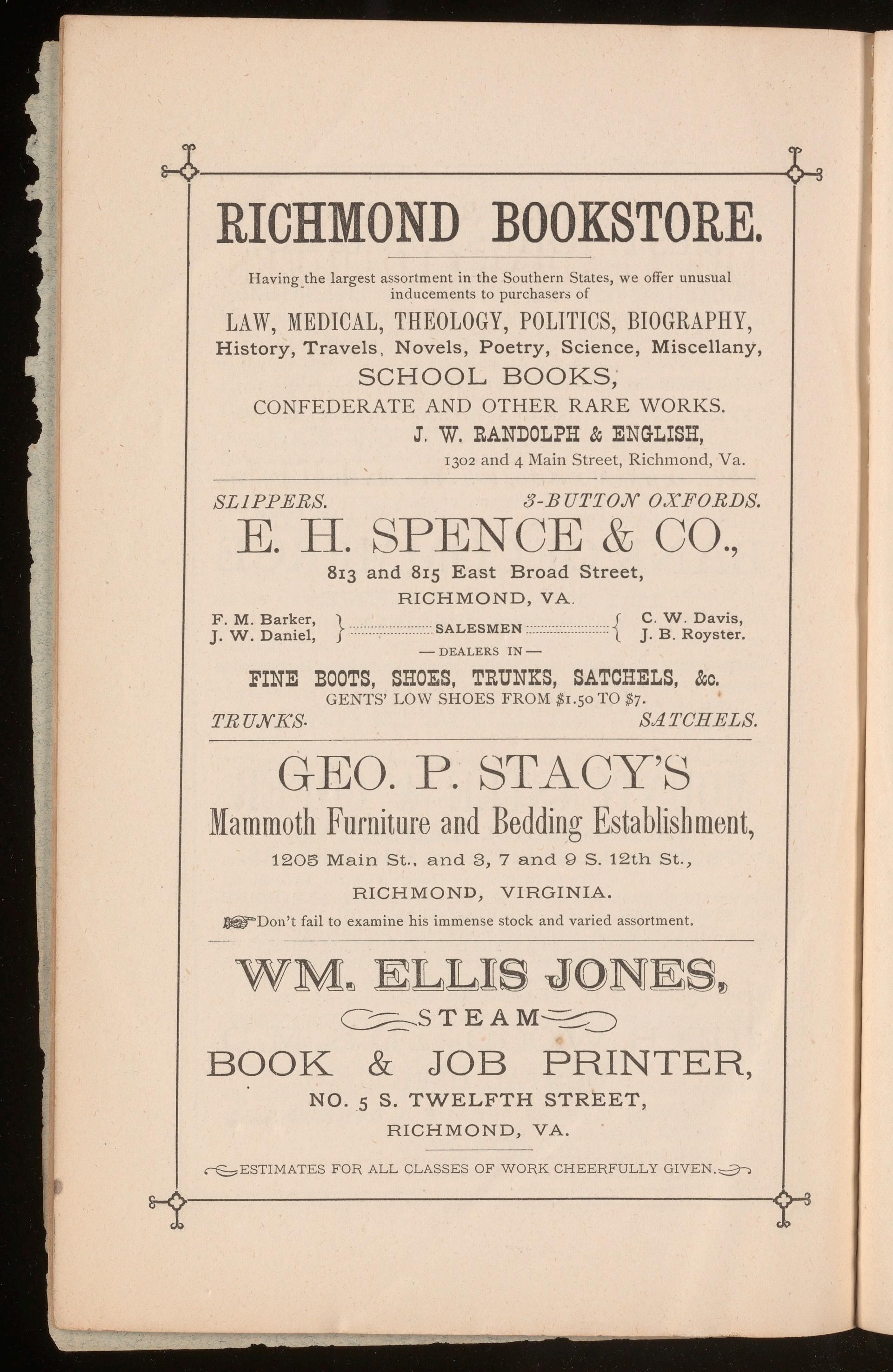
Having the largest assortment in the Southern States, we offer unusual · inducements to purchasers of LAW,MEDICAL,THEOLOGY,POLITICS,BIOGRAPHY, History, Travels, Novels, Poetry, Science, Miscellany, SCHOOL BOOKS; CONFEDERATE AND OTHER RARE WORKS. J, W. RANDOLPH & ENGLISH, 1302 and 4 Main Street, Richmond, Va. SLIPPERS. 3-BUTTON OXFORDS.
813 and 815 East Broad Street, RICHMOND, VA. F. M. Barker, } J. W. Daniel,
ELEGANT STOCK FINE READY-MADE CLOTHING, GENTS' FURNISHING GOODS AND HATS. MERCHANT TAILORING IN THE BEST GRADE. SAMPLES AND PRICES SENT FREE ON APPLlCATION.
~icADAMS & BERRY, Tenth and Main Streets, Richmond, Va.
No.723MAINSTREET 1 · RICHMOND,VA,
CHAS. L. STEEL, M. D., D. D : S ., Assistant.
822 EAST MAIN STREET,
Solicits his friends and the public to call and examine one of the largest selections of FINE FOREIGN GOODS FOR SPRING AND SUMMER ever offered in this market. Will be made by skilled workmen in the LA TEST STYLES AT PRICES THAT· MUST SUIT.
JOHN E . DOHERTY. N. B.-SHIRTS, COLLARS, and CUFFS made to order as heretofore, and satisfaction guaranteed.
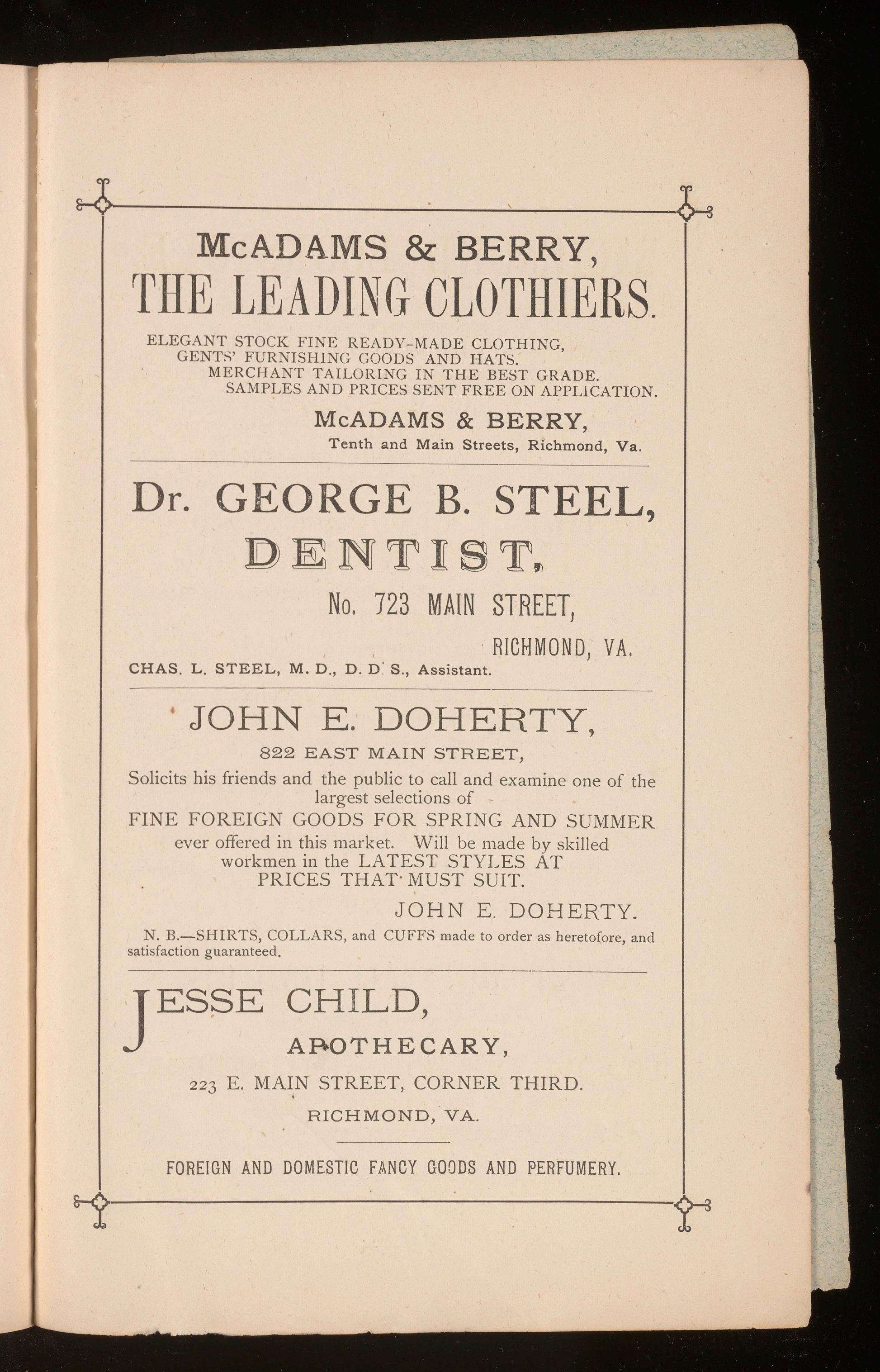
CHILD, Af\OTHECARY,
223 E. MAI_N STREET, CORNER THIRD. RICHMOND, VA.
FOREIGNANDDOMESTICFANCYGOODSANDPERFUMERY,
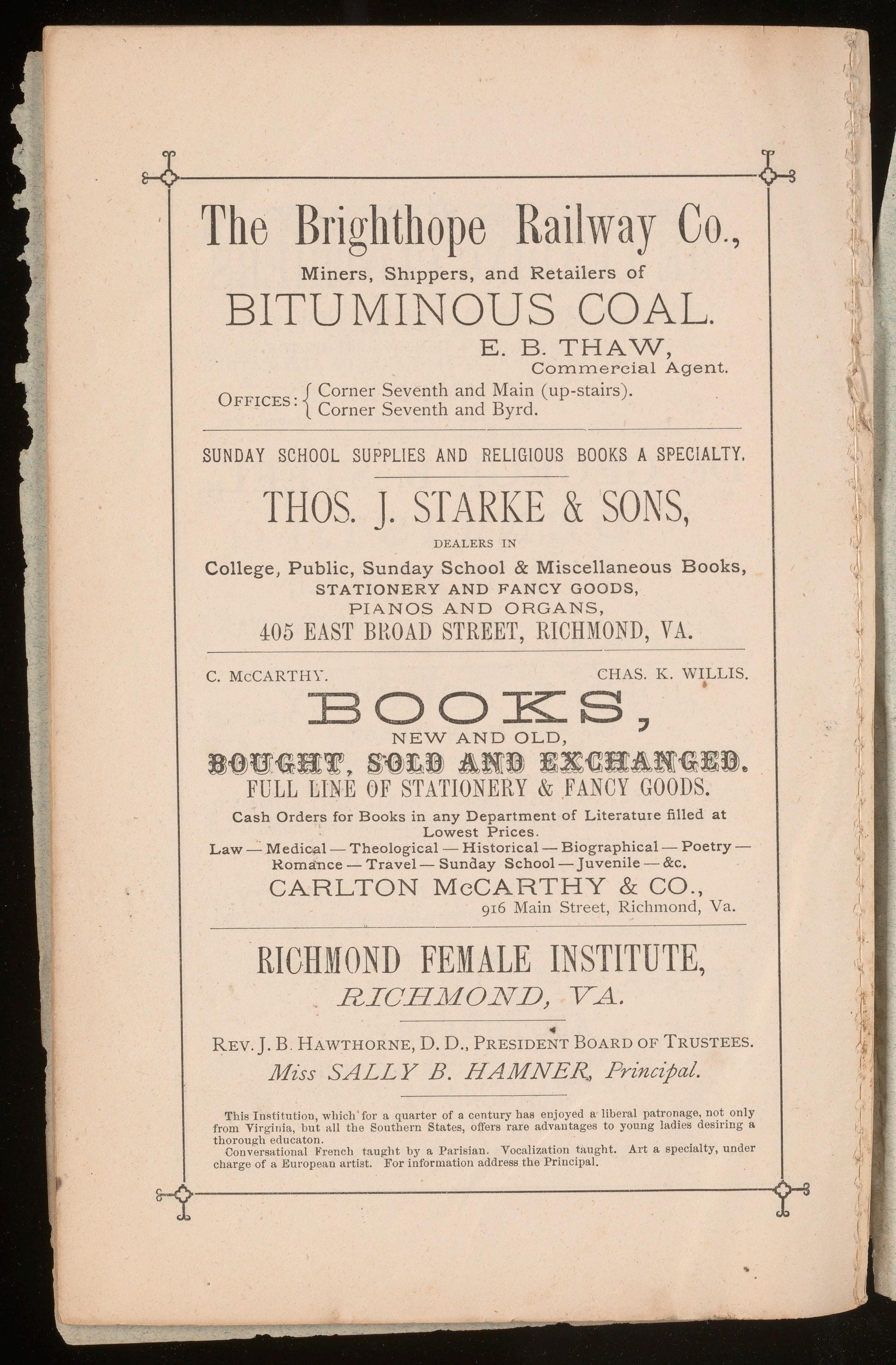
Miners, Shippers, and Retailers of
E. B. THAW, Commercial Agent.
OFFICES: { Corner Seventh and Main (up-stairs). Corner Seventh and Byrd.
SUNDAYSCHOOLSUPPLIESANDRELIGIOUSBOOKSA SPECIALTY,
DEALERS IN
College, Public, Sunday School & Miscellaneous Books, STATIONERY AND FANCY GOODS, PIANOS AND ORGANS, 405 EASTBROADSTREET,RICHMOND,VA.
C. McCARTHY . CHAS. K. WILLIS.
NEW' AND OLD, , BOU~!IT SOLD AND EX~RANGEDe FULLLINE OF STATIONERY & .FANCYGOODS.
Cash Orders for Books in any Department of Literature filled at Lowest Prices.
Law -Medical-Theological - Historical -Biographical-PoetryRomance -Travel-Sunaay School-Juvenile - &c.
CARLTON McCARTHY & CO., 916 Main Street, Richmond, Va. RICHMONDFEMALEINSTITUTE,
VA . ..
REv.J. B. HAWTHORNE, D.D., PRESIDENT BOARD OF TRUSTEES. Miss SALLY B. HAMNER, Principal.
This Imititution, which for a quR-rter of a century bas enjoyed a lib eral patronage, not only from Vir g inia , but all the Southern States, offers rare adYantages to young ladi es desiring a thorough educa ton. Conversational Frenc h taupJ1t by a Parisian. Vocalization taught. Art a specialty, under charge of a Europea.n artist. For information address the Principal.
